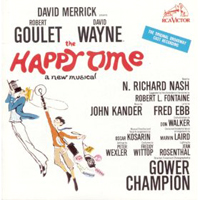 Original Broadway Cast, 1968 (RCA)
Original Broadway Cast, 1968 (RCA)  (4 / 5) This is a charming if inconsequential cast album of a show that missed the mark onstage. The score, by John Kander and Fred Ebb (Cabaret, Chicago), lives up to their reputation as the kings of great opening numbers. In this case, it’s the title song, so magnificently sung by Robert Goulet that you’ll think you’re about to hear one of Broadway’s all-time great musicals. Melodic, evocative, and dramatic, the song is a joyous ode to the wonders of childhood and memories of hometown life. However, the show that follows it was not embraced by the public, which had its mind on less innocent events in 1968. Whether or not the timing of this sweet, simple musical is responsible for its obscurity remains a mystery. What’s left behind is a lovely recording of a beautiful score that includes little-known but inspired ballads such as “I Don’t Remember You” and “Walking Among My Yesterdays,” plus showstoppers like “The Life of the Party” and “A Certain Girl.” Goulet’s Tony Award-winning performance shows why he was a great singing star of the 1960s; David Wayne is also excellent as the curmudgeonly Grandpapa. Although The Happy Time is not regarded as a precious gem from the golden era of musical theater, this album is a must for Kander and Ebb fans. — Gerard Alessandrini
(4 / 5) This is a charming if inconsequential cast album of a show that missed the mark onstage. The score, by John Kander and Fred Ebb (Cabaret, Chicago), lives up to their reputation as the kings of great opening numbers. In this case, it’s the title song, so magnificently sung by Robert Goulet that you’ll think you’re about to hear one of Broadway’s all-time great musicals. Melodic, evocative, and dramatic, the song is a joyous ode to the wonders of childhood and memories of hometown life. However, the show that follows it was not embraced by the public, which had its mind on less innocent events in 1968. Whether or not the timing of this sweet, simple musical is responsible for its obscurity remains a mystery. What’s left behind is a lovely recording of a beautiful score that includes little-known but inspired ballads such as “I Don’t Remember You” and “Walking Among My Yesterdays,” plus showstoppers like “The Life of the Party” and “A Certain Girl.” Goulet’s Tony Award-winning performance shows why he was a great singing star of the 1960s; David Wayne is also excellent as the curmudgeonly Grandpapa. Although The Happy Time is not regarded as a precious gem from the golden era of musical theater, this album is a must for Kander and Ebb fans. — Gerard Alessandrini
All posts by Michael Portantiere
Happy Hunting
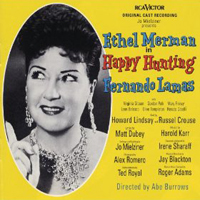 Original Broadway Cast, 1956 (RCA)
Original Broadway Cast, 1956 (RCA)  (3 / 5) Ethel Merman’s only flop starred her as Liz Livingston, a wealthy, rough-at-the-edges widow from Philadelphia who decides to beat Grace Kelly at her own game and marry off her daughter to royalty — in this case, Spanish royalty (Fernando Lamas). The flimsy book by Howard Lindsay and Russel Crouse, who apparently hoped to repeat the topical success of Call Me Madam, wasn’t loved by critics. However, the score — written by a pair of Broadway neophytes, composer Harold Karr and lyricist Matt Dubey in a style that can only be called “School of Irving Berlin” — does contain a number of tasty items. Merman’s voice turns everything to gold, especially her jubilant intro number, “Gee, But It’s Good to Be Here,” in which she holds one note for an impossible length of time and then goes up a step without taking a breath. Also fun are the risqué “Mr. Livingstone,” in which Liz recalls her marriage, and the balled “This Is What I Call Love.” Lamas scores with the lushly romantic “It’s Like a Beautiful Woman.” The numbers for the inevitable young lovers (Virginia Gibson and Gordon Polk) are disposable, and the topical lyrics, as in “The Wedding of the Year Blues,” are dated and silly. Still, even the weakest of songs benefit from Ted Royal’s orchestrations, with their swingy undertones. — David Barbour
(3 / 5) Ethel Merman’s only flop starred her as Liz Livingston, a wealthy, rough-at-the-edges widow from Philadelphia who decides to beat Grace Kelly at her own game and marry off her daughter to royalty — in this case, Spanish royalty (Fernando Lamas). The flimsy book by Howard Lindsay and Russel Crouse, who apparently hoped to repeat the topical success of Call Me Madam, wasn’t loved by critics. However, the score — written by a pair of Broadway neophytes, composer Harold Karr and lyricist Matt Dubey in a style that can only be called “School of Irving Berlin” — does contain a number of tasty items. Merman’s voice turns everything to gold, especially her jubilant intro number, “Gee, But It’s Good to Be Here,” in which she holds one note for an impossible length of time and then goes up a step without taking a breath. Also fun are the risqué “Mr. Livingstone,” in which Liz recalls her marriage, and the balled “This Is What I Call Love.” Lamas scores with the lushly romantic “It’s Like a Beautiful Woman.” The numbers for the inevitable young lovers (Virginia Gibson and Gordon Polk) are disposable, and the topical lyrics, as in “The Wedding of the Year Blues,” are dated and silly. Still, even the weakest of songs benefit from Ted Royal’s orchestrations, with their swingy undertones. — David Barbour
The Happiest Girl in the World
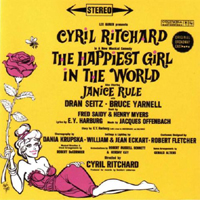 Original Broadway Cast, 1961 (DRG)
Original Broadway Cast, 1961 (DRG)  (5 / 5) “Ev’ry man, I must alert you / When seeking a lady fair / Always gravitates to virtue / Still hoping it won’t be there.” These four lines, echoing W.S. Gilbert, are only a meager sampling of the wit that E.Y. Harburg brought to this musical adaptation of Aristophanes’ Lysistrata, in which the title character persuades the ladies of Greece to withhold sexual favors until their bellicose spouses stop pursuing war. When they do, hell breaks loose — and so does heaven. Perhaps all good lyricists are philosophers; if so, Harburg, forever contemplating man’s inhumanity to man, was one of the most philosophical, but he never forgot to keep ’em laughing while sending the message. Known for trying his collaborators’ patience, Harburg must have found this one of his smoothest assignments in that he was working with the lilting music of the long-deceased Jacques Offenbach, who couldn’t talk back. Harburg’s words sit on Offenbach’s melting tunes as a gondola glides on a cosmic sea in the masterful lyricist’s “Adrift on a Star,” a setting of the beloved barcarole from The Tales of Hoffman. Hearing this virtually flawless, operetta-like score, you might wonder why The Happiest Girl in the World only played 96 performances. Explanation: The Fred Saidy-Henry Myers book made for a listless, substrata Lysistrata. The show’s high points are on the CD, and that definitely includes Cyril Ritchard — the personisfication of “fey” — performing as both a highborn Greek and the troublemaking Pluto. Janice Rule, not known for musicals, sings well here as the goddess Diana, who’s on the girls’ side. Dran Seitz as the title character, and Bruce Yarnell as General Kinesias, warble beautifully. So does everyone in the large chorus, Lainie Kazan among them. The orchestrations are by the great Robert Russell Bennett, with the equally great Hershy Kay. Conductor Robert DeCormier did the vocal arrangements. In other words, top professional work all around. — David Finkle
(5 / 5) “Ev’ry man, I must alert you / When seeking a lady fair / Always gravitates to virtue / Still hoping it won’t be there.” These four lines, echoing W.S. Gilbert, are only a meager sampling of the wit that E.Y. Harburg brought to this musical adaptation of Aristophanes’ Lysistrata, in which the title character persuades the ladies of Greece to withhold sexual favors until their bellicose spouses stop pursuing war. When they do, hell breaks loose — and so does heaven. Perhaps all good lyricists are philosophers; if so, Harburg, forever contemplating man’s inhumanity to man, was one of the most philosophical, but he never forgot to keep ’em laughing while sending the message. Known for trying his collaborators’ patience, Harburg must have found this one of his smoothest assignments in that he was working with the lilting music of the long-deceased Jacques Offenbach, who couldn’t talk back. Harburg’s words sit on Offenbach’s melting tunes as a gondola glides on a cosmic sea in the masterful lyricist’s “Adrift on a Star,” a setting of the beloved barcarole from The Tales of Hoffman. Hearing this virtually flawless, operetta-like score, you might wonder why The Happiest Girl in the World only played 96 performances. Explanation: The Fred Saidy-Henry Myers book made for a listless, substrata Lysistrata. The show’s high points are on the CD, and that definitely includes Cyril Ritchard — the personisfication of “fey” — performing as both a highborn Greek and the troublemaking Pluto. Janice Rule, not known for musicals, sings well here as the goddess Diana, who’s on the girls’ side. Dran Seitz as the title character, and Bruce Yarnell as General Kinesias, warble beautifully. So does everyone in the large chorus, Lainie Kazan among them. The orchestrations are by the great Robert Russell Bennett, with the equally great Hershy Kay. Conductor Robert DeCormier did the vocal arrangements. In other words, top professional work all around. — David Finkle
Hannah…1939
 Original Off-Broadway Cast, 1992 (JAY) No stars; not recommended. Produced by the Vineyard Theatre, this show was much more serious — and much weaker — than composer-lyricist Bob Merrill’s earlier work, notably, New Girl in Town, Take Me Along, Carnival, Funny Girl (for which he provided lyrics only to Jule Styne’s music), and a few other quickly closed flops. In Hannah, Julie Wilson plays a famous Jewish clothing designer whose dress business is commandeered by the Nazis for the purpose of making uniforms. Perhaps because of the seriousness of the characters and the milieu, the energy that marked Merrill’s previous shows is not in evidence here. Linked to the drably plotted book, which includes a number of unenlightening flashbacks, the score sounds like one long, dreary song. — David Wolf
Original Off-Broadway Cast, 1992 (JAY) No stars; not recommended. Produced by the Vineyard Theatre, this show was much more serious — and much weaker — than composer-lyricist Bob Merrill’s earlier work, notably, New Girl in Town, Take Me Along, Carnival, Funny Girl (for which he provided lyrics only to Jule Styne’s music), and a few other quickly closed flops. In Hannah, Julie Wilson plays a famous Jewish clothing designer whose dress business is commandeered by the Nazis for the purpose of making uniforms. Perhaps because of the seriousness of the characters and the milieu, the energy that marked Merrill’s previous shows is not in evidence here. Linked to the drably plotted book, which includes a number of unenlightening flashbacks, the score sounds like one long, dreary song. — David Wolf
Hank Williams: Lost Highway
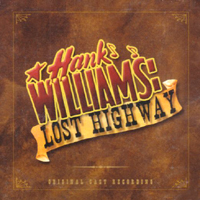 Original Off-Broadway Cast, 2003 (Fynsworrh Alley)
Original Off-Broadway Cast, 2003 (Fynsworrh Alley)  (3 / 5) Fans of country-music icon Hank Williams may hesitate to buy the album of this Off-Broadway biomusical when there are so many recordings of the real deal available. But it’s a fine CD nonetheless, and a good introduction to the music of Williams, whose numerous hits — ”Jambalaya (On the Bayou),” “I’m So Lonesome I Could Cry,” and “Your Cheatin’ Heart,” to name only a few heard here — captured numerous hearts during his brief career. The recording preserves many of the show’s dramatic moments, interspersing dialogue with its two dozen tunes. (“Hey Good Lookin’ ,” first heard in a purposefully bad rendition that’s meant to illustrate Williams’ descent into drunkenness, appears again unsullied in a bonus track.) The amazing Jason Petty, whose crooning and yodeling could almost be mistaken for Williams’ own, delivers crisp renditions of these classic songs with the help of a tight instrumental ensemble featuring Myk Watford on guitar, Drew Perkins on violin, and Stephen G. Anthony on bass. Michael W. Howell, a blues singer who inspires Williams, lends his rich voice to the soulful “This Is the Way I Do” and “The Blood Done Sign My Name.” — Brooke Pierce
(3 / 5) Fans of country-music icon Hank Williams may hesitate to buy the album of this Off-Broadway biomusical when there are so many recordings of the real deal available. But it’s a fine CD nonetheless, and a good introduction to the music of Williams, whose numerous hits — ”Jambalaya (On the Bayou),” “I’m So Lonesome I Could Cry,” and “Your Cheatin’ Heart,” to name only a few heard here — captured numerous hearts during his brief career. The recording preserves many of the show’s dramatic moments, interspersing dialogue with its two dozen tunes. (“Hey Good Lookin’ ,” first heard in a purposefully bad rendition that’s meant to illustrate Williams’ descent into drunkenness, appears again unsullied in a bonus track.) The amazing Jason Petty, whose crooning and yodeling could almost be mistaken for Williams’ own, delivers crisp renditions of these classic songs with the help of a tight instrumental ensemble featuring Myk Watford on guitar, Drew Perkins on violin, and Stephen G. Anthony on bass. Michael W. Howell, a blues singer who inspires Williams, lends his rich voice to the soulful “This Is the Way I Do” and “The Blood Done Sign My Name.” — Brooke Pierce
Halllelujah, Baby!
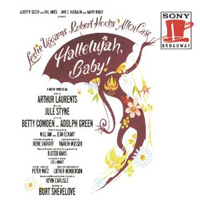 Original Broadway Cast, 1967 (Columbia/Sony)
Original Broadway Cast, 1967 (Columbia/Sony)  (2 / 5) Here’s the gimmick: The show, with a book by Arthur Laurents, takes us from a Southern plantation in 1900 to New York in the ’60s, yet the four main characters never age. Three of them are black, and the entire story is an allegory of the changing roles of blacks in American society. Sounds clever but, in 1967, Hallelujah, Baby! pleased nobody. What was intended as progressive came off as patronizing. (Walter Kerr’s tart assessment in The New York Times: “A course in Civics One when everyone in the world has already got to Civics Six.”) Yet Leslie Uggams scored a personal triumph, and the score — music by Jule Styne, lyrics by Betty Comden and Adolph Green — is filled with distinctive songs. Uggams’ first number, “My Own Morning,” with its assertive lyrics and oddly loping melody, gets things off to a fine start. Later, she has the raucous, self-aware “I Wanted to Change Him” and the unsentimental, oddly minor-keyed “Being Good.” Then there’s the melancholy trio “Talking to Myself’ and the kicky title tune. Not everything is at this level; the first act sometimes seems to be marking time with numbers pointing out the silliness of racism. And one tune, “Witches Brew,” is a shamelessly recycled version of “Call Me Savage” from Fade Out-Fade In. Still, Uggams is divine throughout, the rest of the cast is strong, and at least in terms of the score, the good far outweighs the bad. — David Barbour
(2 / 5) Here’s the gimmick: The show, with a book by Arthur Laurents, takes us from a Southern plantation in 1900 to New York in the ’60s, yet the four main characters never age. Three of them are black, and the entire story is an allegory of the changing roles of blacks in American society. Sounds clever but, in 1967, Hallelujah, Baby! pleased nobody. What was intended as progressive came off as patronizing. (Walter Kerr’s tart assessment in The New York Times: “A course in Civics One when everyone in the world has already got to Civics Six.”) Yet Leslie Uggams scored a personal triumph, and the score — music by Jule Styne, lyrics by Betty Comden and Adolph Green — is filled with distinctive songs. Uggams’ first number, “My Own Morning,” with its assertive lyrics and oddly loping melody, gets things off to a fine start. Later, she has the raucous, self-aware “I Wanted to Change Him” and the unsentimental, oddly minor-keyed “Being Good.” Then there’s the melancholy trio “Talking to Myself’ and the kicky title tune. Not everything is at this level; the first act sometimes seems to be marking time with numbers pointing out the silliness of racism. And one tune, “Witches Brew,” is a shamelessly recycled version of “Call Me Savage” from Fade Out-Fade In. Still, Uggams is divine throughout, the rest of the cast is strong, and at least in terms of the score, the good far outweighs the bad. — David Barbour
Hairspray
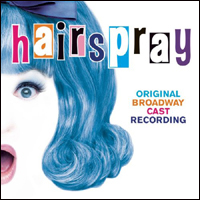 Original Broadway Cast, 2002 (Sony)
Original Broadway Cast, 2002 (Sony)  (5 / 5) The CD itself is gussied up to look like a Phil Spector 45, and that’s typical of the attention to detail in this lively aural document of an irresistible musical comedy. Though based on John Waters’ 1988 movie of the same title, Hairspray plays more like a faux-naif Bye Bye Birdie, propelled by ’60s rock ‘n’ roll pastiche songs with just enough irony lurking at the edges. Marc Shaiman and Scott Wittman’s score has a lot of heart, along with a sincere plea for tolerance, beneath all that jive. When Marissa Jaret Winokur kicks off with “Good Morning Baltimore,” sung to perfection, we’re all hers. From there, the album is pretty much a nonstop delight that employs every color of the era’s pop palette, from girl-group bubblegum (“Mama, I’m a Big Girl Now”) to gospel soulfulness (“I Know Where I’ve Been”). As Edna Turnblad, Harvey Fierstein sings with verve; he and the indispensable Dick Latessa as Edna’s husband, Wilbur, bring the house down in their “Timeless to Me” duet. Mary Bond Davis, Corey Reynolds, Linda Hart, Matthew Morrison, and Kerry Butler all help out loads in other roles. A bonus track allows us to hear a cut song, the giggly/grisly “Blood on the Pavement,” but it’s unnecessary; we’ve long since been won over. Salutes also to Lon Hoyt’s energetic musical direction and Harold Wheeler’s fab orchestrations. The Ronettes never had it so good! — Marc Miller
(5 / 5) The CD itself is gussied up to look like a Phil Spector 45, and that’s typical of the attention to detail in this lively aural document of an irresistible musical comedy. Though based on John Waters’ 1988 movie of the same title, Hairspray plays more like a faux-naif Bye Bye Birdie, propelled by ’60s rock ‘n’ roll pastiche songs with just enough irony lurking at the edges. Marc Shaiman and Scott Wittman’s score has a lot of heart, along with a sincere plea for tolerance, beneath all that jive. When Marissa Jaret Winokur kicks off with “Good Morning Baltimore,” sung to perfection, we’re all hers. From there, the album is pretty much a nonstop delight that employs every color of the era’s pop palette, from girl-group bubblegum (“Mama, I’m a Big Girl Now”) to gospel soulfulness (“I Know Where I’ve Been”). As Edna Turnblad, Harvey Fierstein sings with verve; he and the indispensable Dick Latessa as Edna’s husband, Wilbur, bring the house down in their “Timeless to Me” duet. Mary Bond Davis, Corey Reynolds, Linda Hart, Matthew Morrison, and Kerry Butler all help out loads in other roles. A bonus track allows us to hear a cut song, the giggly/grisly “Blood on the Pavement,” but it’s unnecessary; we’ve long since been won over. Salutes also to Lon Hoyt’s energetic musical direction and Harold Wheeler’s fab orchestrations. The Ronettes never had it so good! — Marc Miller
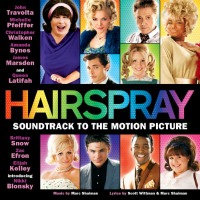 Film Soundtrack, 2007 (New Line Records)
Film Soundtrack, 2007 (New Line Records)  (4 / 5) A reasonably faithful and exuberant film version of Hairspray was released in 2007, and this soundtrack album captures a lot of the fun. Nikki Blonsky is a perfectly capable Tracy, if not quite as special as Marissa Jaret Winokur, and a starry supporting cast — Zac Efron, Queen Latifah, Christopher Walken, Michelle Pfeiffer, James Marsden — seems to be having a great time. The one unfortunate performance is the precious, consonant-chewing Edna of John Travolta, who reminds me, for some reason, of Carol Channing. There are a couple of bonus tracks, including a valuable “Mama, I’m a Big Girl Now” (sadly cut from the film) sung by three Tracys: Winokur, Blonsky, and Ricki Lake (who played the part in the John Waters movie). The big-Hollywood orchestrations are enjoyable, but unlike Harold Wheeler’s originals, they don’t sound like they were lifted right off a Phil Spector 45. — M.M.
(4 / 5) A reasonably faithful and exuberant film version of Hairspray was released in 2007, and this soundtrack album captures a lot of the fun. Nikki Blonsky is a perfectly capable Tracy, if not quite as special as Marissa Jaret Winokur, and a starry supporting cast — Zac Efron, Queen Latifah, Christopher Walken, Michelle Pfeiffer, James Marsden — seems to be having a great time. The one unfortunate performance is the precious, consonant-chewing Edna of John Travolta, who reminds me, for some reason, of Carol Channing. There are a couple of bonus tracks, including a valuable “Mama, I’m a Big Girl Now” (sadly cut from the film) sung by three Tracys: Winokur, Blonsky, and Ricki Lake (who played the part in the John Waters movie). The big-Hollywood orchestrations are enjoyable, but unlike Harold Wheeler’s originals, they don’t sound like they were lifted right off a Phil Spector 45. — M.M.
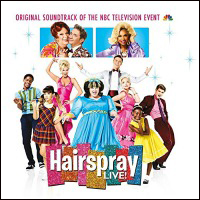 Television Cast, 2016 (Masterworks Broadway)
Television Cast, 2016 (Masterworks Broadway)  (3 / 5) NBC-TV gave Hairspray a deluxe live presentation in 2016 — just after the Presidential election, at a time when its target audience needed its message of tolerance and inclusion the most. A studio recording rather than the actual soundtrack of the telecast, this album is missing the unused “The Big Dollhouse,” but otherwise it’s a near-complete presentation of the score. It even includes Velma’s “Miss Baltimore Crabs” reprise and a rousing new finale, “Come So Far (Got So Far to Go).” Harvey Fierstein, giving Edna one more go-round, is raspier and lower-voiced than ever, but he pairs nicely with Martin Short on “Timeless to Me.” The new Tracy, Maddie Baillio, is a little tentative on “Good Morning, Baltimore” but soon warms up. There’s luxury casting throughout: Kristin Chenoweth sounds like she’s having a blast as Velma, and while Jennifer Hudson’s physically all wrong for Maybelle, she certainly sings the hell out of “I Know Where I’ve Been.” Garrett Clayton (Link) and Derek Hough (Corny) make little impression, a few choice lyrics are missing, and the tempi of some of the songs could have been sped up a bit. But this is such a big-hearted, happy show that’s it’s nice to have another fine recording of the score, and a few of the tracks — Chenoweth’s and Hudson’s, notably — compare favorably with the originals. — M.M.
(3 / 5) NBC-TV gave Hairspray a deluxe live presentation in 2016 — just after the Presidential election, at a time when its target audience needed its message of tolerance and inclusion the most. A studio recording rather than the actual soundtrack of the telecast, this album is missing the unused “The Big Dollhouse,” but otherwise it’s a near-complete presentation of the score. It even includes Velma’s “Miss Baltimore Crabs” reprise and a rousing new finale, “Come So Far (Got So Far to Go).” Harvey Fierstein, giving Edna one more go-round, is raspier and lower-voiced than ever, but he pairs nicely with Martin Short on “Timeless to Me.” The new Tracy, Maddie Baillio, is a little tentative on “Good Morning, Baltimore” but soon warms up. There’s luxury casting throughout: Kristin Chenoweth sounds like she’s having a blast as Velma, and while Jennifer Hudson’s physically all wrong for Maybelle, she certainly sings the hell out of “I Know Where I’ve Been.” Garrett Clayton (Link) and Derek Hough (Corny) make little impression, a few choice lyrics are missing, and the tempi of some of the songs could have been sped up a bit. But this is such a big-hearted, happy show that’s it’s nice to have another fine recording of the score, and a few of the tracks — Chenoweth’s and Hudson’s, notably — compare favorably with the originals. — M.M. Hair
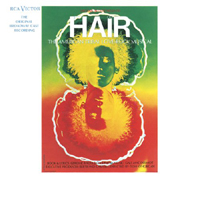 Original Off-Broadway and Broadway Casts, 1967/1968 (RCA, 2CDs)
Original Off-Broadway and Broadway Casts, 1967/1968 (RCA, 2CDs)  (1 / 5) Many musical theater traditionalists were nonplussed when the seminal rock musical Hair was a big success Off-Broadway and then on Broadway in the late 1960s. But the overall excellence of the score of this seminal rock musical, with truly great music by Galt MacDermot and scattershot-quality lyrics by Gerome Ragni and James Rado, was recognized from the beginning, and several songs from the show became pop hits that received a lot of radio airplay — most notably “Aquarius,” “Let the Sunshine In,” “Good Morning, Starshine,” and “Easy to Be Hard.” Unfortunately, judging on the basis of the cast albums, the original productions were deplorable in that they featured lots of substandard singing, as is proved by RCA’s re-release of those albums in a two-CD Broadway Deluxe Collector’s Edition. On both discs, the singing ranges from very good (in a few cases) to merely adequate and right on down to execrable; for example, as recorded for the Off-Broadway album, “Aquarius” and “Good Morning, Starshine” are sung so poorly and so far off-pitch that you’ll gasp. The few listenable performances of songs from MacDermot’s phenomenal score are to be found on the Broadway recording. Among them are Lynn Kellogg’s “Easy to Be Hard” and Shelley Plimpton’s “Frank Mills, ” plus it’s fun to hear a young Diane Keaton and Melba Moore in “Black Boys” and “White Boys,” respectively. Leads Ragni (as Berger) and Rado (as Claude), who wrote the book for the show as well as the lyrics, sing well enough, but their interpretations lack theatrical charisma. With the exceptions noted above, and a couple of others, the performances to be found on these recordings are off-putting and dispiriting — which didn’t stop the Broadway album from becoming a best-seller anyway. — Michael Portantiere
(1 / 5) Many musical theater traditionalists were nonplussed when the seminal rock musical Hair was a big success Off-Broadway and then on Broadway in the late 1960s. But the overall excellence of the score of this seminal rock musical, with truly great music by Galt MacDermot and scattershot-quality lyrics by Gerome Ragni and James Rado, was recognized from the beginning, and several songs from the show became pop hits that received a lot of radio airplay — most notably “Aquarius,” “Let the Sunshine In,” “Good Morning, Starshine,” and “Easy to Be Hard.” Unfortunately, judging on the basis of the cast albums, the original productions were deplorable in that they featured lots of substandard singing, as is proved by RCA’s re-release of those albums in a two-CD Broadway Deluxe Collector’s Edition. On both discs, the singing ranges from very good (in a few cases) to merely adequate and right on down to execrable; for example, as recorded for the Off-Broadway album, “Aquarius” and “Good Morning, Starshine” are sung so poorly and so far off-pitch that you’ll gasp. The few listenable performances of songs from MacDermot’s phenomenal score are to be found on the Broadway recording. Among them are Lynn Kellogg’s “Easy to Be Hard” and Shelley Plimpton’s “Frank Mills, ” plus it’s fun to hear a young Diane Keaton and Melba Moore in “Black Boys” and “White Boys,” respectively. Leads Ragni (as Berger) and Rado (as Claude), who wrote the book for the show as well as the lyrics, sing well enough, but their interpretations lack theatrical charisma. With the exceptions noted above, and a couple of others, the performances to be found on these recordings are off-putting and dispiriting — which didn’t stop the Broadway album from becoming a best-seller anyway. — Michael Portantiere
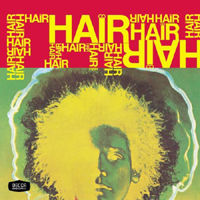 Original London Cast 1968 (Decca)
Original London Cast 1968 (Decca)  (1 / 5) Decca released two LPs worth of recordings of songs from the original London production of Hair, “the American tribal love-rock musical.” As Peter Knight explains in his notes for the CD release, “the show contains some 34 titles but, when the initial recording [of the London Hair} was made in 1968, it was impossible to cram them all onto one 12-inch vinyl pressing … Fresh Hair [a follow-up album} was conceived to resolve the problem.” Both albums are included in full on the single CD. Unfortunately, the singing here is often as ragged and out of tune as what’s to be heard on the recordings of the Off-Broadway and Broadway productions. That sadly includes very shaky performances of “Aquarius,” led by J. Vincent Edwards, and “Sodomy,” led by Michael Feast. Leads Oliver Tobias, Paul Nicholas, and Annabel Leventon fare much better. (Nicholas would be heard from again, in several subsequent West End musicals and on their cast albums.) Still, for a really worthy recording of this great score with solid singing across the board, look elsewhere. (See below.) — M.P.
(1 / 5) Decca released two LPs worth of recordings of songs from the original London production of Hair, “the American tribal love-rock musical.” As Peter Knight explains in his notes for the CD release, “the show contains some 34 titles but, when the initial recording [of the London Hair} was made in 1968, it was impossible to cram them all onto one 12-inch vinyl pressing … Fresh Hair [a follow-up album} was conceived to resolve the problem.” Both albums are included in full on the single CD. Unfortunately, the singing here is often as ragged and out of tune as what’s to be heard on the recordings of the Off-Broadway and Broadway productions. That sadly includes very shaky performances of “Aquarius,” led by J. Vincent Edwards, and “Sodomy,” led by Michael Feast. Leads Oliver Tobias, Paul Nicholas, and Annabel Leventon fare much better. (Nicholas would be heard from again, in several subsequent West End musicals and on their cast albums.) Still, for a really worthy recording of this great score with solid singing across the board, look elsewhere. (See below.) — M.P.
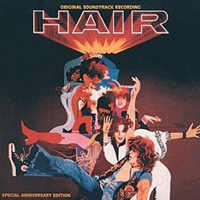 Film Soundtrack, 1979 (RCA)
Film Soundtrack, 1979 (RCA)  (5 / 5) The film version of Hair was a vast improvement over the original stage productions in New York and London, not only in terms of its script (a brilliant adaptation by Michael Weller), but also for the overall excellent representation of the score. To begin with, the songs are sung very well — and almost all of the voices you hear are actually those of the performers you see on screen. Treat Williams is an ideal Berger, bursting with subversive energy in “Donna” and “I Got Life.”John Savage sings “Where Do I Go?” with great beauty of tone as well as great depth of feeling, and he engagingly duets with Williams in “Manchester.” Don Dacus is funny and very appealing as Woof in “Sodomy” and “Hair.” Cheryl Barnes sings the hell out of “Easy to Be Hard.” And, in her one brief solo spot, Beverly D’Angelo brings a sweet voice to “Good Morning, Starshine,” even if she does sing one or two notes off pitch. Two alums of the Broadway staging of Hair, Melba Moore and Ronnie Dyson, sing powerfully in the terrifying “3-5-0-0,” while Nell Carter and Ellen Foley turn up elsewhere. The phenomenal score is thrillingly arranged and conducted by composer Galt MacDermot himself, with Tom Pierson as vocal arranger/conductor. This recording was originally released on two LPs, but the longer playing time of CDs allowed all of that content to be issued on one disc, and now the entire recording is available as a digital download. As was the case with some previous film soundtrack albums — for example, Carousel and The King and I — the Hair recording includes full versions of several songs from the original score that were edited down for the film itself (“Donna,” Black Boys”) or cut entirely (most notably “Frank Mills”). The only really negative thing to be said about this recording is that, annoyingly, none of the vocalists are specifically credited anywhere in the CD package — and that includes Betty Buckley, who sings the “Walking in Space” solo but does not actually appear in the film. — M.P.
(5 / 5) The film version of Hair was a vast improvement over the original stage productions in New York and London, not only in terms of its script (a brilliant adaptation by Michael Weller), but also for the overall excellent representation of the score. To begin with, the songs are sung very well — and almost all of the voices you hear are actually those of the performers you see on screen. Treat Williams is an ideal Berger, bursting with subversive energy in “Donna” and “I Got Life.”John Savage sings “Where Do I Go?” with great beauty of tone as well as great depth of feeling, and he engagingly duets with Williams in “Manchester.” Don Dacus is funny and very appealing as Woof in “Sodomy” and “Hair.” Cheryl Barnes sings the hell out of “Easy to Be Hard.” And, in her one brief solo spot, Beverly D’Angelo brings a sweet voice to “Good Morning, Starshine,” even if she does sing one or two notes off pitch. Two alums of the Broadway staging of Hair, Melba Moore and Ronnie Dyson, sing powerfully in the terrifying “3-5-0-0,” while Nell Carter and Ellen Foley turn up elsewhere. The phenomenal score is thrillingly arranged and conducted by composer Galt MacDermot himself, with Tom Pierson as vocal arranger/conductor. This recording was originally released on two LPs, but the longer playing time of CDs allowed all of that content to be issued on one disc, and now the entire recording is available as a digital download. As was the case with some previous film soundtrack albums — for example, Carousel and The King and I — the Hair recording includes full versions of several songs from the original score that were edited down for the film itself (“Donna,” Black Boys”) or cut entirely (most notably “Frank Mills”). The only really negative thing to be said about this recording is that, annoyingly, none of the vocalists are specifically credited anywhere in the CD package — and that includes Betty Buckley, who sings the “Walking in Space” solo but does not actually appear in the film. — M.P.
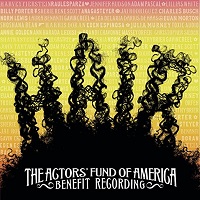 Actors’ Fund of America Benefit Concert Cast, 2005 (Ghostlight)
Actors’ Fund of America Benefit Concert Cast, 2005 (Ghostlight)  (4 / 5) Here’s an excellent studio recording of a memorable benefit concert presentation of Hair that did full justice to Galt MacDermot’s epoch-making score. The only caveat here is that the songs were distributed among the Broadway star-studded cast without regard to the characters who sang them in the original production; but since the stage version of Hair has never been known for the cohesion of its narrative or the depth of its characters, that honestly doesn’t matter too much. The ensemble is strong and energized throughout, and the many highlights among the solo vocals include Lillias White’s “Aquarius,” Chuck Cooper’s “Colored Spade,” Euan Morton’s “Manchester, England,” Raúl Esparza’s “Hair,” Charles Bush’s “My Conviction,” Jennifer Hudson’s “Easy to Be Hard,” Annie Golden’s “Frank Mills,” Liz Callaway’s “Good Morning, Starshine,” and Norm Lewis’s “Flesh Failures.” Two items of special interest are a scorching hot performance of “Goin’ Down,” one of Hair‘s more obscure numbers, by Gavin Creel, who would go on to play Claude Hooper Bukowski in the 2009 Broadway revival; and Harvey Fierstein’s hilarious take on “Air,” a song for which his uniquely gravelly voice is perfect. Indeed, the only misfire on this recording is Lea DeLaria’s “Donna,” because the range and style of the song are not well suited to her abilities. Under musical director Seth Rudetsky, a large orchestra plays the brilliant score with tremendous verve, but also with far more discipline than one can hear on the earliest cast recordings. (Hair is about free spirits, but there are limits!) — M.P.
(4 / 5) Here’s an excellent studio recording of a memorable benefit concert presentation of Hair that did full justice to Galt MacDermot’s epoch-making score. The only caveat here is that the songs were distributed among the Broadway star-studded cast without regard to the characters who sang them in the original production; but since the stage version of Hair has never been known for the cohesion of its narrative or the depth of its characters, that honestly doesn’t matter too much. The ensemble is strong and energized throughout, and the many highlights among the solo vocals include Lillias White’s “Aquarius,” Chuck Cooper’s “Colored Spade,” Euan Morton’s “Manchester, England,” Raúl Esparza’s “Hair,” Charles Bush’s “My Conviction,” Jennifer Hudson’s “Easy to Be Hard,” Annie Golden’s “Frank Mills,” Liz Callaway’s “Good Morning, Starshine,” and Norm Lewis’s “Flesh Failures.” Two items of special interest are a scorching hot performance of “Goin’ Down,” one of Hair‘s more obscure numbers, by Gavin Creel, who would go on to play Claude Hooper Bukowski in the 2009 Broadway revival; and Harvey Fierstein’s hilarious take on “Air,” a song for which his uniquely gravelly voice is perfect. Indeed, the only misfire on this recording is Lea DeLaria’s “Donna,” because the range and style of the song are not well suited to her abilities. Under musical director Seth Rudetsky, a large orchestra plays the brilliant score with tremendous verve, but also with far more discipline than one can hear on the earliest cast recordings. (Hair is about free spirits, but there are limits!) — M.P.
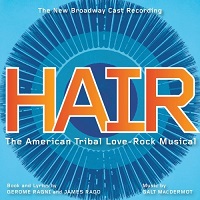 Broadway Cast, 2009 (Ghostlight)
Broadway Cast, 2009 (Ghostlight)  (5 / 5) Even if one didn’t see this production live, its cast album provides evidence that, from a musical/vocal standpoint at least, it was one Broadway revival that can be rated as far superior to the original production(s). Gavin Creel’s voice, one of the most beautiful heard on Broadway thus far in the 21st century, is a great pleasure to experience in Claude’s songs, especially “Where Do I Go?” Will Swenson oozes charisma and sex appeal as Berger, and judging from his performances of “Donna” and other songs, he had not yet begun to experience the pitch problems that befell him later in his career. Sasha Allen gets the recording off to a thrilling start with her singing of “Aquarius,” Caissie Levy as Sheila does a lovely job with “Easy to Be Hard” and “Good Morning, Starshine,” Allison Case as Crissy is adorable in “Frank Mills,” and Andrew Korber as “Margaret Mead” is a stitch in “My Conviction.” But really, everyone in the “tribe” sounds great, as does the orchestra under conductor/keyboardist Nadia DiGiallonardo. Because all of the songs here are sung by the specific characters for whom they were originally written, as was not the case with the 2005 recording reviewed above, this must be rated as the overall best cast album of Hair to date. — M.P.
(5 / 5) Even if one didn’t see this production live, its cast album provides evidence that, from a musical/vocal standpoint at least, it was one Broadway revival that can be rated as far superior to the original production(s). Gavin Creel’s voice, one of the most beautiful heard on Broadway thus far in the 21st century, is a great pleasure to experience in Claude’s songs, especially “Where Do I Go?” Will Swenson oozes charisma and sex appeal as Berger, and judging from his performances of “Donna” and other songs, he had not yet begun to experience the pitch problems that befell him later in his career. Sasha Allen gets the recording off to a thrilling start with her singing of “Aquarius,” Caissie Levy as Sheila does a lovely job with “Easy to Be Hard” and “Good Morning, Starshine,” Allison Case as Crissy is adorable in “Frank Mills,” and Andrew Korber as “Margaret Mead” is a stitch in “My Conviction.” But really, everyone in the “tribe” sounds great, as does the orchestra under conductor/keyboardist Nadia DiGiallonardo. Because all of the songs here are sung by the specific characters for whom they were originally written, as was not the case with the 2005 recording reviewed above, this must be rated as the overall best cast album of Hair to date. — M.P.
Gypsy
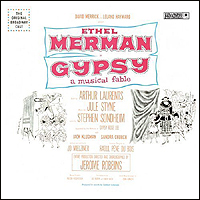 Original Broadway Cast, 1959 (Columbia/Sony)
Original Broadway Cast, 1959 (Columbia/Sony)  (5 / 5) From the blaring trumpets that begin the overture to the final chords of “Rose’s Turn,” this is a recording that grabs you and never lets go. Representing Jule Styne, Stephen Sondheim, and several other great musical theater artists at the peak of their powers, the flawlessly integrated musical Gypsy is further elevated by this album’s breathtaking performances. It’s clear that Ethel Merman knew she had the role of her career in Rose, and was going to make certain that the audio document of her performance would jump off of the vinyl on which it was originally released. In “Some People,” she just about shakes you by the shoulders with Rose’s ambition — and then she touches your heart with the character’s yearning in “Small World.” Later on, she both thrills and terrifies you in “Everything’s Coming Up Roses.” Finally, there’s her “Rose’s Turn,” a performance that may someday be equaled but will almost certainly never be surpassed: It’s a moment to-moment exploration of an emotional breakdown and breakthrough, the equivalent of several years of therapy in five minutes. The supporting cast is worthy of the star. Sandra Church is a totally convincing Louise, from her heartfelt “Little Lamb” to “Let Me Entertain You.” On Sony’s most recent CD edition of this original cast album, Church can be heard squealing with delight at the end of Paul Wallace’s flawless “All I Need Is the Girl,” a magnificent theatrical moment previously thought to be lost. Jack Klugman’s contributions to the recording are wonderful if not extensive. Maria Karnilova, Faith Dane,and Chotzi Foley make a feast of “You Gotta Have a Gimmick,” and the CD happily gives us the previously deleted sections of the number: Tessie’s “ballet” and the round before the final section. The disc is filled out with demo recordings of several of the show’s songs, some with lyrics that were later changed, sung by Merman with Jule Styne at the piano. There’s no introductory dialogue on the recording, and it’s too bad that Merman’s orchestra-punctuated spoken lines into “Some People,” her dialogue with Jack Klugman before “Small World,” and her speech before “Rose’s Turn” weren’t recorded. One may also question the re-orchestration of some songs for the album, including “Some People” and “Small World.” Still, this recording deserves an honored place in every collection. — Jeffrey Dunn
(5 / 5) From the blaring trumpets that begin the overture to the final chords of “Rose’s Turn,” this is a recording that grabs you and never lets go. Representing Jule Styne, Stephen Sondheim, and several other great musical theater artists at the peak of their powers, the flawlessly integrated musical Gypsy is further elevated by this album’s breathtaking performances. It’s clear that Ethel Merman knew she had the role of her career in Rose, and was going to make certain that the audio document of her performance would jump off of the vinyl on which it was originally released. In “Some People,” she just about shakes you by the shoulders with Rose’s ambition — and then she touches your heart with the character’s yearning in “Small World.” Later on, she both thrills and terrifies you in “Everything’s Coming Up Roses.” Finally, there’s her “Rose’s Turn,” a performance that may someday be equaled but will almost certainly never be surpassed: It’s a moment to-moment exploration of an emotional breakdown and breakthrough, the equivalent of several years of therapy in five minutes. The supporting cast is worthy of the star. Sandra Church is a totally convincing Louise, from her heartfelt “Little Lamb” to “Let Me Entertain You.” On Sony’s most recent CD edition of this original cast album, Church can be heard squealing with delight at the end of Paul Wallace’s flawless “All I Need Is the Girl,” a magnificent theatrical moment previously thought to be lost. Jack Klugman’s contributions to the recording are wonderful if not extensive. Maria Karnilova, Faith Dane,and Chotzi Foley make a feast of “You Gotta Have a Gimmick,” and the CD happily gives us the previously deleted sections of the number: Tessie’s “ballet” and the round before the final section. The disc is filled out with demo recordings of several of the show’s songs, some with lyrics that were later changed, sung by Merman with Jule Styne at the piano. There’s no introductory dialogue on the recording, and it’s too bad that Merman’s orchestra-punctuated spoken lines into “Some People,” her dialogue with Jack Klugman before “Small World,” and her speech before “Rose’s Turn” weren’t recorded. One may also question the re-orchestration of some songs for the album, including “Some People” and “Small World.” Still, this recording deserves an honored place in every collection. — Jeffrey Dunn
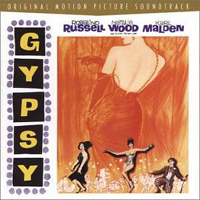 Film Soundtrack, 1962 (Warner Bros.lRhino-Turner)
Film Soundtrack, 1962 (Warner Bros.lRhino-Turner)  (4 / 5) It took a long time for the Gypsy soundtrack album to show up on CD, but this Rhino release proved to be well worth the wait. George Feltenstein did an excellent job of producing the disc and writing the informative notes. The recording was remastered, and the complete version of “Dainty June and Her Newsboys” is included. The biggest bonus of all is the added tracks of Rosalind Russell singing Rose’s songs, which were almost entirely dubbed for the film by Lisa Kirk. In Russell’s autobiography, she insists that she did all of her own singing in Gypsy, but that’s simply not true; only her vocals for “Mr. Goldstone, I Love You” and some sections of “Rose’s Turn” made the final cut of the film, but Kirk’s dubbing of the other songs is very skillful. In general, Russell acts the songs wonderfully well, yet her singing leaves much to be desired. However, in “Together,” which was cut from the movie, she sings delightfully, as do Natalie Wood and Karl Malden. Wood’s “Little Lamb” is touching if not pretty, and she sounds fine duetting with Ann Jillian in “If Momma Was Married.” As Tulsa, Paul Wallace recreates his Broadway performance of “All I Need Is the Girl.” The Broadway cast’s Faith Dane leads the strippers in “You Gotta Have a Gimmick,” and Malden handles Herbie’s minimal vocals well enough. This CD offers “Rose’s Turn” in two versions: the “album version,” which is all Lisa Kirk, and the film version, which is part Kirk and part Russell. The thrilling overture is conducted by composer Jule Styne. — J.D.
(4 / 5) It took a long time for the Gypsy soundtrack album to show up on CD, but this Rhino release proved to be well worth the wait. George Feltenstein did an excellent job of producing the disc and writing the informative notes. The recording was remastered, and the complete version of “Dainty June and Her Newsboys” is included. The biggest bonus of all is the added tracks of Rosalind Russell singing Rose’s songs, which were almost entirely dubbed for the film by Lisa Kirk. In Russell’s autobiography, she insists that she did all of her own singing in Gypsy, but that’s simply not true; only her vocals for “Mr. Goldstone, I Love You” and some sections of “Rose’s Turn” made the final cut of the film, but Kirk’s dubbing of the other songs is very skillful. In general, Russell acts the songs wonderfully well, yet her singing leaves much to be desired. However, in “Together,” which was cut from the movie, she sings delightfully, as do Natalie Wood and Karl Malden. Wood’s “Little Lamb” is touching if not pretty, and she sounds fine duetting with Ann Jillian in “If Momma Was Married.” As Tulsa, Paul Wallace recreates his Broadway performance of “All I Need Is the Girl.” The Broadway cast’s Faith Dane leads the strippers in “You Gotta Have a Gimmick,” and Malden handles Herbie’s minimal vocals well enough. This CD offers “Rose’s Turn” in two versions: the “album version,” which is all Lisa Kirk, and the film version, which is part Kirk and part Russell. The thrilling overture is conducted by composer Jule Styne. — J.D.
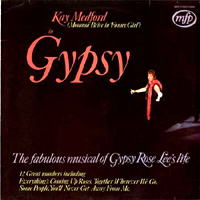 Studio Cast, 1969 (Music For Pleasure/no CD) No stars; not recommended. This is the strangest Gypsy recording of all. Kay Medford had played another showbiz mama, Mrs. Brice, in another Jule Styne musical, Funny Girl, so it may have seemed a good idea to give her a shot at Rose for that reason. But, of course, the vocal demands of the Gypsy role are vastly greater. Produced by Norman Newell and featuring something close to the original orchestrations, this recording was made in London. Its first oddity comes in “Some People,” when Medford sings a rarely heard lyric: “Some people can sit and stare, living life in a rocking chair.” Her sliding into notes here is regrettable, but then she unexpectedly captures you with a rendition of “Small World” that’s nicely sung and well interpreted. Medford works hard in “Everything’s Coming Up Roses,” but her acting doesn’t compensate for her singing, especially not at the climax of the number. As for the other performers heard briefly on the album: In “If Momma Was Married,” the Louise is boring while the June sounds very British and doesn’t sing well, and in “All I Need Is the Girl,” the Tulsa comes across like a London chorus boy rather than a would-be vaudevillian. The strippers are fine — but after all, “You Gotta Have a Gimmick” is almost indestructible. The recording ends with Medford’s rather grim performance of “Rose’s Turn.” — J.D.
Studio Cast, 1969 (Music For Pleasure/no CD) No stars; not recommended. This is the strangest Gypsy recording of all. Kay Medford had played another showbiz mama, Mrs. Brice, in another Jule Styne musical, Funny Girl, so it may have seemed a good idea to give her a shot at Rose for that reason. But, of course, the vocal demands of the Gypsy role are vastly greater. Produced by Norman Newell and featuring something close to the original orchestrations, this recording was made in London. Its first oddity comes in “Some People,” when Medford sings a rarely heard lyric: “Some people can sit and stare, living life in a rocking chair.” Her sliding into notes here is regrettable, but then she unexpectedly captures you with a rendition of “Small World” that’s nicely sung and well interpreted. Medford works hard in “Everything’s Coming Up Roses,” but her acting doesn’t compensate for her singing, especially not at the climax of the number. As for the other performers heard briefly on the album: In “If Momma Was Married,” the Louise is boring while the June sounds very British and doesn’t sing well, and in “All I Need Is the Girl,” the Tulsa comes across like a London chorus boy rather than a would-be vaudevillian. The strippers are fine — but after all, “You Gotta Have a Gimmick” is almost indestructible. The recording ends with Medford’s rather grim performance of “Rose’s Turn.” — J.D.
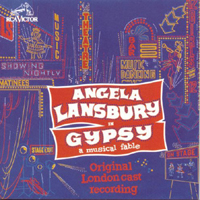 Original London Cast, 1973 (RCA)
Original London Cast, 1973 (RCA)  (4 / 5) London didn’t get to see Gypsy until 1973, when Angela Lansbury starred as Rose under the direction of the show’s librettist, Arthur Laurents. When the eagerly awaited cast album arrived on these shores, listeners were immediately taken with the star’s fresh approach to the character. Lansbury’s Rose was electric in a totally different way from Merman’s. There were some revisions in the songs for this production; for example, “The Strip” (“Let Me Entertain You”) now has Louise/Gypsy speaking to the audience in addition to singing and changing outfits. Barrie Ingham, as Herbie, makes the most of his musical moments, and Zan Charisse is perfect as Louise. The vaudeville sequences have been telescoped into something called “Let Me Entertain You” (Montage) that gives us some of Bonnie Langford’s hilarious Baby June and some of Debbie Bowen’s Dainty June. On the LP, Lansbury’s tracks were a bit raw but amazingly vital; she was also the first Rose on record to sing the final note of “Some People” as written in the score, to thrilling effect. However, when the album was issued in the United States, it was apparent that Lansbury had re-recorded some of her solo tracks. Those performances, retained on the CD, are somewhat lacking in immediacy and excitement as compared with the others. Still, in both versions, Lansbury’s “Everything’s Coming Up Roses” is powerful, and her “Rose’s Turn” is classic. — J.D.
(4 / 5) London didn’t get to see Gypsy until 1973, when Angela Lansbury starred as Rose under the direction of the show’s librettist, Arthur Laurents. When the eagerly awaited cast album arrived on these shores, listeners were immediately taken with the star’s fresh approach to the character. Lansbury’s Rose was electric in a totally different way from Merman’s. There were some revisions in the songs for this production; for example, “The Strip” (“Let Me Entertain You”) now has Louise/Gypsy speaking to the audience in addition to singing and changing outfits. Barrie Ingham, as Herbie, makes the most of his musical moments, and Zan Charisse is perfect as Louise. The vaudeville sequences have been telescoped into something called “Let Me Entertain You” (Montage) that gives us some of Bonnie Langford’s hilarious Baby June and some of Debbie Bowen’s Dainty June. On the LP, Lansbury’s tracks were a bit raw but amazingly vital; she was also the first Rose on record to sing the final note of “Some People” as written in the score, to thrilling effect. However, when the album was issued in the United States, it was apparent that Lansbury had re-recorded some of her solo tracks. Those performances, retained on the CD, are somewhat lacking in immediacy and excitement as compared with the others. Still, in both versions, Lansbury’s “Everything’s Coming Up Roses” is powerful, and her “Rose’s Turn” is classic. — J.D.
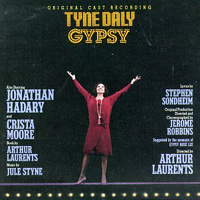 Broadway Cast, 1990 (Elektra-Nonesuch)
Broadway Cast, 1990 (Elektra-Nonesuch)  (2 / 5) Tyne Daly was reported to be having vocal problems when this album was made, but if that’s true, it doesn’t seem to have daunted her in the role of Rose. The recording includes some dialogue which enhances the enjoyment of her performance. Daly and Jonathan Hadary turn “Small World” into a gem of a duet. While Daly’s voice does show some signs of wear in “Everything’s Coming Up Roses,” the introductory spoken lines propel her into singing with a desperation that really makes the number land. Crista Moore is mostly good as Louise, but “The Strip,” in a newly rewritten version, is weak. The strippers — Barbara Erwin, Jana Robbins, and Anna McNeely — display loads of showbiz savvy in “You Gotta Have a Gimmick,” and Robert Lambert is a solid Tulsa. As for “Rose’s Turn,” it begins almost as a toss-off, but then Daly gradually gains intensity and growls her way to an almost defeated ending. — J.D.
(2 / 5) Tyne Daly was reported to be having vocal problems when this album was made, but if that’s true, it doesn’t seem to have daunted her in the role of Rose. The recording includes some dialogue which enhances the enjoyment of her performance. Daly and Jonathan Hadary turn “Small World” into a gem of a duet. While Daly’s voice does show some signs of wear in “Everything’s Coming Up Roses,” the introductory spoken lines propel her into singing with a desperation that really makes the number land. Crista Moore is mostly good as Louise, but “The Strip,” in a newly rewritten version, is weak. The strippers — Barbara Erwin, Jana Robbins, and Anna McNeely — display loads of showbiz savvy in “You Gotta Have a Gimmick,” and Robert Lambert is a solid Tulsa. As for “Rose’s Turn,” it begins almost as a toss-off, but then Daly gradually gains intensity and growls her way to an almost defeated ending. — J.D.
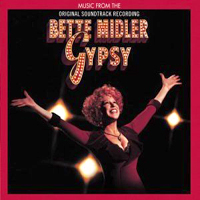 Television Film Soundtrack, 1993 (Atlantic)
Television Film Soundtrack, 1993 (Atlantic)  (3 / 5) The TV movie of Gypsy starring Bette Midler is textually faithful to the stage version of the musical. The production was controversial; many fans of the show had trouble accepting Midler as Rose, but hers is an estimable performance, and this soundtrack recording has much to offer. To start with, Michael Rafter does a fine job with the beloved overture — but now the quibbles begin. The recording includes almost no dialogue, although we do get to hear Ed Asner’s recognizable voice as Pop in “Some People.” The lack of spoken lines limits the dramatic impact of “Small World,” “You’ll Never Get Away From Me,” and “Together,” even if these numbers benefit greatly from the very pleasant presence of Peter Riegert as Herbie. For whatever reasons, much of what’s good about the film doesn’t translate to the soundtrack recordnig. Cynthia Gibb doesn’t make a strong vocal impression as Louise; her “Let Me Entertain You” is only saved by some voice-overs tracing her climb to Minsky’s. Also, neither “All I Need Is the Girl” nor “You Gotta Have a Gimmick” register strongly without the visuals. But then there is Midler. According to producer Craig Zadan’s notes, the star performed most of her vocals live. The spontaneity and verve that she brings to this classic score must be partly credited to that wise choice, one so rarely made when musicals are filmed. “Some People” bristles, “Small World” allows Rose to melt Herbie with a creamy vocal, and “Everything’s Coming Up Roses” is suitably scary. The glory of the disc is Midler’s superb “Rose’s Turn”; she acts her way through every moment of the number with enormous guts, bringing it to a searing climax. — J.D.
(3 / 5) The TV movie of Gypsy starring Bette Midler is textually faithful to the stage version of the musical. The production was controversial; many fans of the show had trouble accepting Midler as Rose, but hers is an estimable performance, and this soundtrack recording has much to offer. To start with, Michael Rafter does a fine job with the beloved overture — but now the quibbles begin. The recording includes almost no dialogue, although we do get to hear Ed Asner’s recognizable voice as Pop in “Some People.” The lack of spoken lines limits the dramatic impact of “Small World,” “You’ll Never Get Away From Me,” and “Together,” even if these numbers benefit greatly from the very pleasant presence of Peter Riegert as Herbie. For whatever reasons, much of what’s good about the film doesn’t translate to the soundtrack recordnig. Cynthia Gibb doesn’t make a strong vocal impression as Louise; her “Let Me Entertain You” is only saved by some voice-overs tracing her climb to Minsky’s. Also, neither “All I Need Is the Girl” nor “You Gotta Have a Gimmick” register strongly without the visuals. But then there is Midler. According to producer Craig Zadan’s notes, the star performed most of her vocals live. The spontaneity and verve that she brings to this classic score must be partly credited to that wise choice, one so rarely made when musicals are filmed. “Some People” bristles, “Small World” allows Rose to melt Herbie with a creamy vocal, and “Everything’s Coming Up Roses” is suitably scary. The glory of the disc is Midler’s superb “Rose’s Turn”; she acts her way through every moment of the number with enormous guts, bringing it to a searing climax. — J.D.
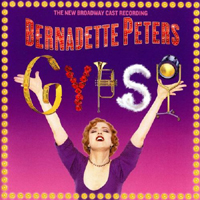 Broadway Cast, 2003 (Angel)
Broadway Cast, 2003 (Angel)  (3 / 5) Whatever one may have thought of this production, the cast album was the most complete preservation of the Gypsy score to be found on a recording up to that time. Almost every track includes dialogue, and there is a great deal of incidental music and underscoring. Bernadette Peters’ Rose is as unique to her personality as her predecessors’ takes on the role were to theirs; she defines the character in her own special way. What comes through on the recording is her variance between charm (“Small World”), strength (“Some People”), vulnerability (the “Small World” reprise), and ferocity (“Everything’s Coming Up Roses”). Peters skillfully juggles all these aspects of the role, finally allowing them to collide brilliantly in “Rose’s Turn.” Tammy Blanchard is not fully convincing as Louise in yet another new version of the “Gypsy Strip,” nor is she very effective in “Little Lamb,” and she’s only a little bit better when singing “If Momma Was Married” with Kate Reinders. John Dossett and David Burtka are far more persuasive as Herbie and Tulsa, respectively. The three strippers — Kate Buddeke, Julie Halston, and Heather Lee — are right-on in “You Gotta Have a Gimmick.” — J.D.
(3 / 5) Whatever one may have thought of this production, the cast album was the most complete preservation of the Gypsy score to be found on a recording up to that time. Almost every track includes dialogue, and there is a great deal of incidental music and underscoring. Bernadette Peters’ Rose is as unique to her personality as her predecessors’ takes on the role were to theirs; she defines the character in her own special way. What comes through on the recording is her variance between charm (“Small World”), strength (“Some People”), vulnerability (the “Small World” reprise), and ferocity (“Everything’s Coming Up Roses”). Peters skillfully juggles all these aspects of the role, finally allowing them to collide brilliantly in “Rose’s Turn.” Tammy Blanchard is not fully convincing as Louise in yet another new version of the “Gypsy Strip,” nor is she very effective in “Little Lamb,” and she’s only a little bit better when singing “If Momma Was Married” with Kate Reinders. John Dossett and David Burtka are far more persuasive as Herbie and Tulsa, respectively. The three strippers — Kate Buddeke, Julie Halston, and Heather Lee — are right-on in “You Gotta Have a Gimmick.” — J.D.
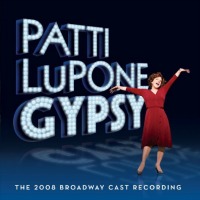 Broadway Cast, 2008 (Time-Life Music)
Broadway Cast, 2008 (Time-Life Music)  (2 / 5) Before Patti LuPone played Rose in Gypsy at the Ravinia Festival, later in a limited run at City Center in New York, and then on Broadway in 2008, the idea of her eventually tackling the role seemed a great one. As it turned out, LuPone won a Tony Award for her efforts, but this recording preserves the broad vocal mannerisms of her performance, which some listeners may consider to be intrusive, overly affected, and self indulgent. Those mannerisms include alternation between straight-tone singing and a normal use of vibrato, fairly frequent and obvious flipping from chest voice to head voice, more than a few wildly distorted vowels — e.g., the word “roses” is repeatedly sung as “rozazz” — and the decision to speak or shout rather than sing in some key moments. The Broadway production was flagrantly over-directed as if with a whip by Arthur Laurents, who wrote the book for the show, and that liability is all too accurately reflected on the cast album; to one degree or another, almost everyone in the company suffers at Laurents’ hand. In the “Madame Rose’s Toreadorables” cut, just listen to the horribly shrieking girls and the wildly exaggerated awfulness of Laura Benanti as Louise’s line reading, “Olé, everybody, my name’s Louise, what’s yours?” (Louise states more than once that she has no talent, but nobody has that much no-talent.) Similarly, although Leigh-Ann Larkin sings very well as Dainty June, she’s over-the-top terrible in her spoken lines in “Dainty June and Her Farmboys.” Boyd Gaines offers a warmly human Herbie under difficult circumstances, Tony Yazbeck is a charming Tulsa in “All I Need is the Girl,” and Benanti’s Louise is very persuasive when Laurents leaves her alone; her “Little Lamb” may well be the most moving version ever recorded. Some unfortunate fussing with tempi aside, the orchestra sounds great under Patrick Vaccariello. This album holds some special interest for its inclusion of several songs that were cut from the show at one point or another as bonus tracks, but the performance of the bulk of the score is highly problematic. — Michael Portantiere
(2 / 5) Before Patti LuPone played Rose in Gypsy at the Ravinia Festival, later in a limited run at City Center in New York, and then on Broadway in 2008, the idea of her eventually tackling the role seemed a great one. As it turned out, LuPone won a Tony Award for her efforts, but this recording preserves the broad vocal mannerisms of her performance, which some listeners may consider to be intrusive, overly affected, and self indulgent. Those mannerisms include alternation between straight-tone singing and a normal use of vibrato, fairly frequent and obvious flipping from chest voice to head voice, more than a few wildly distorted vowels — e.g., the word “roses” is repeatedly sung as “rozazz” — and the decision to speak or shout rather than sing in some key moments. The Broadway production was flagrantly over-directed as if with a whip by Arthur Laurents, who wrote the book for the show, and that liability is all too accurately reflected on the cast album; to one degree or another, almost everyone in the company suffers at Laurents’ hand. In the “Madame Rose’s Toreadorables” cut, just listen to the horribly shrieking girls and the wildly exaggerated awfulness of Laura Benanti as Louise’s line reading, “Olé, everybody, my name’s Louise, what’s yours?” (Louise states more than once that she has no talent, but nobody has that much no-talent.) Similarly, although Leigh-Ann Larkin sings very well as Dainty June, she’s over-the-top terrible in her spoken lines in “Dainty June and Her Farmboys.” Boyd Gaines offers a warmly human Herbie under difficult circumstances, Tony Yazbeck is a charming Tulsa in “All I Need is the Girl,” and Benanti’s Louise is very persuasive when Laurents leaves her alone; her “Little Lamb” may well be the most moving version ever recorded. Some unfortunate fussing with tempi aside, the orchestra sounds great under Patrick Vaccariello. This album holds some special interest for its inclusion of several songs that were cut from the show at one point or another as bonus tracks, but the performance of the bulk of the score is highly problematic. — Michael Portantiere
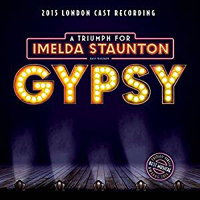 London Cast, 2015 (First Night Records)
London Cast, 2015 (First Night Records)  (2 / 5) The most praiseworthy aspect of Imelda Staunton’s performance as Rose is the quality of her singing when judged from a purely musical standpoint. A live commercial video of this 2015 London production of Gypsy reveals a portrayal of the role that some have rated as aggressively over-acted, strident, lacking in charm, and more “indicated” than felt. But on the cast album, which of course focuses on the show’s musical moments and includes not much dialogue, Staunton comes across much better. She also deserves credit for her well-done American accent, a few “anuhthings” and “everuhthings” aside. On that note, compared to the 1973 London cast recording with Angela Lansbury, the accent work of the ensemble here is generally far superior; the “newsboys,” for example, sound convincingly American, rather than like a bunch of urchins who wandered in from Oliver! The supporting cast is generally fine, especially Lara Pulver as Louise. But while the orchestrations for reduced forces are well done for what they are, a full string section is sorely missed at several points in the score, such as the phenomenal “Overture.” That’s a major disappointment of this recording. — M.P.
(2 / 5) The most praiseworthy aspect of Imelda Staunton’s performance as Rose is the quality of her singing when judged from a purely musical standpoint. A live commercial video of this 2015 London production of Gypsy reveals a portrayal of the role that some have rated as aggressively over-acted, strident, lacking in charm, and more “indicated” than felt. But on the cast album, which of course focuses on the show’s musical moments and includes not much dialogue, Staunton comes across much better. She also deserves credit for her well-done American accent, a few “anuhthings” and “everuhthings” aside. On that note, compared to the 1973 London cast recording with Angela Lansbury, the accent work of the ensemble here is generally far superior; the “newsboys,” for example, sound convincingly American, rather than like a bunch of urchins who wandered in from Oliver! The supporting cast is generally fine, especially Lara Pulver as Louise. But while the orchestrations for reduced forces are well done for what they are, a full string section is sorely missed at several points in the score, such as the phenomenal “Overture.” That’s a major disappointment of this recording. — M.P.
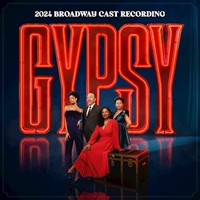 Broadway Cast, 2025 (Warner Music Group/Arts Music/Octoverse Media)
Broadway Cast, 2025 (Warner Music Group/Arts Music/Octoverse Media)  (1 / 5) Audra McDonald is acknowledged as one of the most talented musical theater performers in history, but not even the greatest of stars can do it all. When it was first reported that McDonald would be playing Rose in a new Broadway production of Gypsy — a project she had publicly denied was going to happen, for whatever reason — even some of her greatest fans were surprised by the announcement, because they felt she might be miscast in this bravura role if only from a purely vocal standpoint. As written by Jule Styne and Stephen Sondheim, Rose’s songs were designed to fit the clarion Broadway belt singing style of Ethel Merman, and since then have been sung in the alto belt range by every woman who has played the role in all of the show’s Broadway revivals. Until this one. Two examples of many from the cast album starring McDonald: In Rose’s character establishing song “Some People,” the word “I” in the line “But I-I-I-I at least gotta try” is meant to be belted out of the park, but here’s it’s sung with a far less powerful, lower-register soprano “mix” quality, to very little vocal or dramatic effect. And at the climax of the recording, presumably because McDonald didn’t want to belt the end of “Rose’s Turn” but recognized that it would sound ridiculous if sung with a soprano timbre, she screams and sobs the bulk of the last half of the song with an alarming loss of control. Elsewhere throughout the album, in order to accommodate McDonald’s desire to sing much of the role in her soprano voice, there are numerous transpositions and even modulations within songs, most of them jarring. On top of all the above, McDonald’s performance throughout features so much back-phrasing and so many ill-judged pauses for “effect” that the forward momentum of the music is severely compromised. Further demerits of the album include an unbearably screechy rendition of the “Moo Cow” song by Jordan Tyson as a far-from-dainty June; overacting to the point of vulgarity by Lili Thomas, Mylinda Hull, and Lesli Margherita as the three strippers; lackluster new arrangements and, in some cases, inferior rewriting of the dance music; and conductor Andy Einhorn’s reliance on ritards and rallentandos even more annoying than those heard on the Patti LuPone recording. Some good news: Broadway veteran Danny Burstein is a delight as Herbie, and Joy Woods as Louise offers a touching rendition of “Little Lamb.” But McDonald’s controversial vocal performance and the other serious flaws of this album may cause many listeners to rate it as a highly unsatisfying entry in the discography of a true masterpiece. – M.P.
(1 / 5) Audra McDonald is acknowledged as one of the most talented musical theater performers in history, but not even the greatest of stars can do it all. When it was first reported that McDonald would be playing Rose in a new Broadway production of Gypsy — a project she had publicly denied was going to happen, for whatever reason — even some of her greatest fans were surprised by the announcement, because they felt she might be miscast in this bravura role if only from a purely vocal standpoint. As written by Jule Styne and Stephen Sondheim, Rose’s songs were designed to fit the clarion Broadway belt singing style of Ethel Merman, and since then have been sung in the alto belt range by every woman who has played the role in all of the show’s Broadway revivals. Until this one. Two examples of many from the cast album starring McDonald: In Rose’s character establishing song “Some People,” the word “I” in the line “But I-I-I-I at least gotta try” is meant to be belted out of the park, but here’s it’s sung with a far less powerful, lower-register soprano “mix” quality, to very little vocal or dramatic effect. And at the climax of the recording, presumably because McDonald didn’t want to belt the end of “Rose’s Turn” but recognized that it would sound ridiculous if sung with a soprano timbre, she screams and sobs the bulk of the last half of the song with an alarming loss of control. Elsewhere throughout the album, in order to accommodate McDonald’s desire to sing much of the role in her soprano voice, there are numerous transpositions and even modulations within songs, most of them jarring. On top of all the above, McDonald’s performance throughout features so much back-phrasing and so many ill-judged pauses for “effect” that the forward momentum of the music is severely compromised. Further demerits of the album include an unbearably screechy rendition of the “Moo Cow” song by Jordan Tyson as a far-from-dainty June; overacting to the point of vulgarity by Lili Thomas, Mylinda Hull, and Lesli Margherita as the three strippers; lackluster new arrangements and, in some cases, inferior rewriting of the dance music; and conductor Andy Einhorn’s reliance on ritards and rallentandos even more annoying than those heard on the Patti LuPone recording. Some good news: Broadway veteran Danny Burstein is a delight as Herbie, and Joy Woods as Louise offers a touching rendition of “Little Lamb.” But McDonald’s controversial vocal performance and the other serious flaws of this album may cause many listeners to rate it as a highly unsatisfying entry in the discography of a true masterpiece. – M.P.
Guys and Dolls
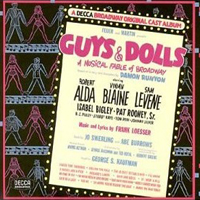 Original Broadway Cast, 1950 (Decca)
Original Broadway Cast, 1950 (Decca)  (4 / 5) While subsequent recordings of Frank Loesser’s Guys and Dolls are superior to this one in certain respects, the performances here are definitive and remain the template for all future productions. Almost every Nathan Detroit is better than Sam Levene as far as singing is concerned, but just listen to Levene’s barely on-pitch pleas to Adelaide in “Sue Me” and you may well feel that his Nathan is unbeatable. In “Adelaide’s Lament,” Vivian Blaine is completely natural, touching, and funny at the same time. In “A Bushel and a Peck” and “Take Back Your Mink,” Blaine makes it clear exactly what kind of performer Miss Adelaide is and what kind of joint she works in. In “Sue Me,” she and Levene give us a textbook example of how a comedy duet should be performed. Robert AIda and Isabel Bigley as Sky Masterson and Sarah Brown do very well in their duets ”I’ll Know” and “I’ve Never Been in Love Before” and are impressive in their respective solos, “Luck Be a Lady” and “If I Were a Bell.” The supporting players are also distinctive, especially the irreplaceable Stubby Kaye as Nicely-Nicely Johnson in “Sit Down, You’re Rockin’ the Boat.” While we have AIda’s “My Time of Day” on the album, it’s regrettable that the dialogue and underscoring that connects the song to “I’ve Never Been in Love Before” were not recorded. Included as bonuses on the latest CD edition are four tracks from the 1955 film version of Guys and Dolls, so we can savor the undubbed performances of Jean Simmons and Marlon Brando in “I’ll Know” and in “A Woman in Love.” (The latter is one of the songs that Loesser wrote for the movie.) Simmons’ “If I Were a Bell” is one of the best-acted versions of this song you are likely to find, and Brando’s “Luck Be a Lady” is unexpectedly effective. [Ed. Note: See review of the very belatedly issued complete film soundtrack album, immediately below.] — Jeffrey Dunn
(4 / 5) While subsequent recordings of Frank Loesser’s Guys and Dolls are superior to this one in certain respects, the performances here are definitive and remain the template for all future productions. Almost every Nathan Detroit is better than Sam Levene as far as singing is concerned, but just listen to Levene’s barely on-pitch pleas to Adelaide in “Sue Me” and you may well feel that his Nathan is unbeatable. In “Adelaide’s Lament,” Vivian Blaine is completely natural, touching, and funny at the same time. In “A Bushel and a Peck” and “Take Back Your Mink,” Blaine makes it clear exactly what kind of performer Miss Adelaide is and what kind of joint she works in. In “Sue Me,” she and Levene give us a textbook example of how a comedy duet should be performed. Robert AIda and Isabel Bigley as Sky Masterson and Sarah Brown do very well in their duets ”I’ll Know” and “I’ve Never Been in Love Before” and are impressive in their respective solos, “Luck Be a Lady” and “If I Were a Bell.” The supporting players are also distinctive, especially the irreplaceable Stubby Kaye as Nicely-Nicely Johnson in “Sit Down, You’re Rockin’ the Boat.” While we have AIda’s “My Time of Day” on the album, it’s regrettable that the dialogue and underscoring that connects the song to “I’ve Never Been in Love Before” were not recorded. Included as bonuses on the latest CD edition are four tracks from the 1955 film version of Guys and Dolls, so we can savor the undubbed performances of Jean Simmons and Marlon Brando in “I’ll Know” and in “A Woman in Love.” (The latter is one of the songs that Loesser wrote for the movie.) Simmons’ “If I Were a Bell” is one of the best-acted versions of this song you are likely to find, and Brando’s “Luck Be a Lady” is unexpectedly effective. [Ed. Note: See review of the very belatedly issued complete film soundtrack album, immediately below.] — Jeffrey Dunn
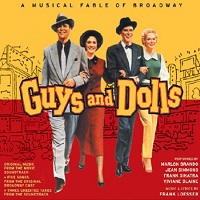 Film Soundtrack, 1955 (Blue Moon)
Film Soundtrack, 1955 (Blue Moon)  (2 / 5) For more than 50 years, no full, non-bootleg soundtrack album of the film version of Guys and Dolls was released, reportedly because no record company could get clearance for Frank Sinatra, who played Nathan Detroit in the movie, to appear on a label other than the one to which he was signed at the time (Capitol). The feeling seems to have been that the public would have no interest in purchasing the album if Sinatra’s voice weren’t on it — especially not since two of the film’s other stars, Marlon Brando as Sky Masterson and Jean Simmons as Sarah Brown, certainly weren’t known as singers. Flash forward to 2007, when the Spanish record company Blue Moon issued a CD of the film score pretty much complete, transferred directly from the soundtrack, with sound effects included in the mix. Whether or not Blue Moon officially licensed these tracks, the quality of writing and editing of the notes in the CD booklet is appallingly unprofessional — as if the text had been ineptly translated from another language, which seems likely under the circumstances. As for the recording itself, the soundtrack is marred by the replacement of “A Bushel and a Peck” from the original score with the vulgar “Pet Me, Poppa,” written by Loesser for the film. (The idiotic reasoning for this decision was that, because “A Bushel and a Peck” had become a Top-40 hit when Guys and Dolls opened on Broadway, the song’s inclusion in the film would have “dated” the picture. So, by that logic, should “Some Enchanted Evening” have been excised from the movie version of South Pacific?) Also axed from the film score are “I’ve Never Been in Love Before” (replaced by the pretty but generic ballad “A Woman in Love”), along with “My Time of Day,” “More I Cannot Wish You,” and “Marry the Man Today,” but another new song is the enjoyable “Adelaide,” for Sinatra with male chorus. However miscast Ol’ Blue Eyes may have been in the role of the nebbishy, small-time gambler Detroit, he sings well in his usual style. Brando as Sky is not unpleasant to hear in his lower and lower-middle registers, and he does a credible job with “Luck, Be a Lady,” but his voice develops an extreme nasality as he moves up the scale, especially in the ballads. In contrast, Simmons as Sarah sounds quite lovely, if obviously untrained as a singer. And it’s fun to have Vivian Blaine, Stubby Kaye, and Johnny Silver recreating their original Broadway roles of Adelaide, Nicely-Nicely Johnson, and Benny Southstreet. A major plus of this soundtrack is that it was recorded in spectacular early stereo — all the better to enjoy the excellent orchestrations by Skip Martin, Nelson Riddle, Alexander Courage, and Al Sendrey as conducted by Broadway veteran Jay Blackton. Bonus material on the CD includes the Broadway cast album performances of the songs that were dropped from the movie, as well as monaural mixes of “I’ll Know,” “If I Were a Bell,” and “A Woman in Love” from the film soundtrack that were released on record back in the day. — Michael Portantiere
(2 / 5) For more than 50 years, no full, non-bootleg soundtrack album of the film version of Guys and Dolls was released, reportedly because no record company could get clearance for Frank Sinatra, who played Nathan Detroit in the movie, to appear on a label other than the one to which he was signed at the time (Capitol). The feeling seems to have been that the public would have no interest in purchasing the album if Sinatra’s voice weren’t on it — especially not since two of the film’s other stars, Marlon Brando as Sky Masterson and Jean Simmons as Sarah Brown, certainly weren’t known as singers. Flash forward to 2007, when the Spanish record company Blue Moon issued a CD of the film score pretty much complete, transferred directly from the soundtrack, with sound effects included in the mix. Whether or not Blue Moon officially licensed these tracks, the quality of writing and editing of the notes in the CD booklet is appallingly unprofessional — as if the text had been ineptly translated from another language, which seems likely under the circumstances. As for the recording itself, the soundtrack is marred by the replacement of “A Bushel and a Peck” from the original score with the vulgar “Pet Me, Poppa,” written by Loesser for the film. (The idiotic reasoning for this decision was that, because “A Bushel and a Peck” had become a Top-40 hit when Guys and Dolls opened on Broadway, the song’s inclusion in the film would have “dated” the picture. So, by that logic, should “Some Enchanted Evening” have been excised from the movie version of South Pacific?) Also axed from the film score are “I’ve Never Been in Love Before” (replaced by the pretty but generic ballad “A Woman in Love”), along with “My Time of Day,” “More I Cannot Wish You,” and “Marry the Man Today,” but another new song is the enjoyable “Adelaide,” for Sinatra with male chorus. However miscast Ol’ Blue Eyes may have been in the role of the nebbishy, small-time gambler Detroit, he sings well in his usual style. Brando as Sky is not unpleasant to hear in his lower and lower-middle registers, and he does a credible job with “Luck, Be a Lady,” but his voice develops an extreme nasality as he moves up the scale, especially in the ballads. In contrast, Simmons as Sarah sounds quite lovely, if obviously untrained as a singer. And it’s fun to have Vivian Blaine, Stubby Kaye, and Johnny Silver recreating their original Broadway roles of Adelaide, Nicely-Nicely Johnson, and Benny Southstreet. A major plus of this soundtrack is that it was recorded in spectacular early stereo — all the better to enjoy the excellent orchestrations by Skip Martin, Nelson Riddle, Alexander Courage, and Al Sendrey as conducted by Broadway veteran Jay Blackton. Bonus material on the CD includes the Broadway cast album performances of the songs that were dropped from the movie, as well as monaural mixes of “I’ll Know,” “If I Were a Bell,” and “A Woman in Love” from the film soundtrack that were released on record back in the day. — Michael Portantiere
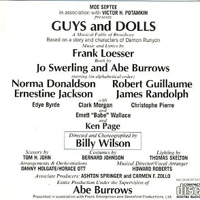 Broadway Cast, 1976 (Motown)
Broadway Cast, 1976 (Motown)  (3 / 5) For this revival of Guys and Dolls with an all-black cast, the original orchestrations were rewritten to achieve a funkier sound. Some of the songs resist that kind of treatment, but one of the times when it really works is in the first duet for Sky and Sarah. Ernestine Jackson sings “I’ll Know” with a solid soprano in a standard Broadway arrangement; then James Randolph swings into an R&B chorus of the song, and the two very different styles of singing tell us much about who these characters are. Later, Jackson’s Sarah loosens up in “If I Were a Bell,” and her voice meshes attractively with Randolph’s in “I’ve Never Been in Love Before.” The new orchestrations may not please traditionalists, but their bounciness and the sense of joy that they create cannot be denied. Robert Guillaume portrays a very dry, leading-mannish Nathan Detroit, and Norma Donaldson is an entertaining Adelaide; her shrieks at the end of “Adelaide’s Lament” are unexpected and very funny. This recording also includes “Adelaide Meets Sarah,” a brief sequence in which “I’ve Never Been in Love Before” is sung in counterpoint with “Adelaide’s Lament,” as it appears in the original score. Ken Page’s “Sit Down, You’re Rockin’ the Boat” is a foot-stomping showstopper with a gospel-style encore included. Though this is by no means a definitive Guys and Dolls, it’s a highly enjoyable listening experience. — J.D.
(3 / 5) For this revival of Guys and Dolls with an all-black cast, the original orchestrations were rewritten to achieve a funkier sound. Some of the songs resist that kind of treatment, but one of the times when it really works is in the first duet for Sky and Sarah. Ernestine Jackson sings “I’ll Know” with a solid soprano in a standard Broadway arrangement; then James Randolph swings into an R&B chorus of the song, and the two very different styles of singing tell us much about who these characters are. Later, Jackson’s Sarah loosens up in “If I Were a Bell,” and her voice meshes attractively with Randolph’s in “I’ve Never Been in Love Before.” The new orchestrations may not please traditionalists, but their bounciness and the sense of joy that they create cannot be denied. Robert Guillaume portrays a very dry, leading-mannish Nathan Detroit, and Norma Donaldson is an entertaining Adelaide; her shrieks at the end of “Adelaide’s Lament” are unexpected and very funny. This recording also includes “Adelaide Meets Sarah,” a brief sequence in which “I’ve Never Been in Love Before” is sung in counterpoint with “Adelaide’s Lament,” as it appears in the original score. Ken Page’s “Sit Down, You’re Rockin’ the Boat” is a foot-stomping showstopper with a gospel-style encore included. Though this is by no means a definitive Guys and Dolls, it’s a highly enjoyable listening experience. — J.D.
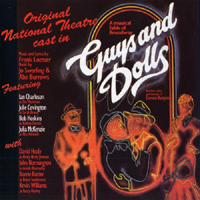 National Theatre Cast, 1982 (Chrysalis/Music For Pleasure) No stars; not recommended. Perhaps it’s necessary to have seen this production to understand why it was a resounding hit in London. The “band” was onstage, playing new orchestrations intended to evoke the Big Band sound of the 1940s. But this sounds like a cheaply produced studio recording of Guys and Dolls, rather than a first-class cast album, and much of what Loesser wrote seems to have been lost. The performances were reportedly wonderful onstage but did not translate well to CD. Ian Charleson as Sky never pretended to be a singer, and his acting does not compensate for his lack of vocal power. Julie Covington’s fluttery vibrato makes her renditions of Sarah Brown’s songs virtually colorless. The Adelaide of the usually brilliant Julia McKenzie doesn’t really register, nor does the Nathan Detroit of Bob Hoskins. David Healy’s “Sit Down, You’re Rockin’ the Boat” is standard issue. Overall, this disc is a huge disappointment. At least Music For Pleasure is a budget label! [Ed. Note: The original London production of Guys and Dolls was in 1953, but while some of the stars recorded some of the songs, nothing close to a complete cast album was released.] — J.D.
National Theatre Cast, 1982 (Chrysalis/Music For Pleasure) No stars; not recommended. Perhaps it’s necessary to have seen this production to understand why it was a resounding hit in London. The “band” was onstage, playing new orchestrations intended to evoke the Big Band sound of the 1940s. But this sounds like a cheaply produced studio recording of Guys and Dolls, rather than a first-class cast album, and much of what Loesser wrote seems to have been lost. The performances were reportedly wonderful onstage but did not translate well to CD. Ian Charleson as Sky never pretended to be a singer, and his acting does not compensate for his lack of vocal power. Julie Covington’s fluttery vibrato makes her renditions of Sarah Brown’s songs virtually colorless. The Adelaide of the usually brilliant Julia McKenzie doesn’t really register, nor does the Nathan Detroit of Bob Hoskins. David Healy’s “Sit Down, You’re Rockin’ the Boat” is standard issue. Overall, this disc is a huge disappointment. At least Music For Pleasure is a budget label! [Ed. Note: The original London production of Guys and Dolls was in 1953, but while some of the stars recorded some of the songs, nothing close to a complete cast album was released.] — J.D.
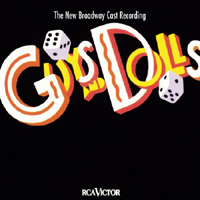 Broadway Cast, 1992 (RCA)
Broadway Cast, 1992 (RCA)  (3 / 5) Here is the cast recording of a hugely successful revival of this great show. Nathan Lane may not be everybody’s idea of Nathan Detroit, but he’s wonderfully comic, sings better than the role’s requirements, and is especially effective in “Sue Me” with Faith Prince as Adelaide. Prince’s characterization is somewhat lacking in vulnerability, but her comedic instincts are dead-on; she does a bang-up job with “Adelaide’s Lament,” and is obviously having a ball in “A Bushel and a Peck” and “Take Back Your Mink.” Josie de Guzman’s lackluster Sarah lets Prince down in “Marry the Man Today,” and is even more harmful in her duets with Peter Gallagher, who is suave, tough, and in fine voice as Sky Masterson. Gallagher does justice to the rousing “Luck Be a lady” (heard here with new dance music) and “My Time of Day.” The recording includes chunks of dialogue that give it a nice sense of theatricality. Although Walter Bobbie is an unconventional choice for the role of Nicely-Nicely Johnson, he makes the role his own; he leads a rousing “Sit Down, You’re Rockin’ the Boat,” and he and J.K. Simmons give an excellent rendition of the title song. The cuts, however small, and re-orchestrations of much of the score (Michael Starobin is billed after the original orchestrators) may limit some listeners’ enjoyment of this performance, but it is strongly conducted by Edward Strauss. — J.D.
(3 / 5) Here is the cast recording of a hugely successful revival of this great show. Nathan Lane may not be everybody’s idea of Nathan Detroit, but he’s wonderfully comic, sings better than the role’s requirements, and is especially effective in “Sue Me” with Faith Prince as Adelaide. Prince’s characterization is somewhat lacking in vulnerability, but her comedic instincts are dead-on; she does a bang-up job with “Adelaide’s Lament,” and is obviously having a ball in “A Bushel and a Peck” and “Take Back Your Mink.” Josie de Guzman’s lackluster Sarah lets Prince down in “Marry the Man Today,” and is even more harmful in her duets with Peter Gallagher, who is suave, tough, and in fine voice as Sky Masterson. Gallagher does justice to the rousing “Luck Be a lady” (heard here with new dance music) and “My Time of Day.” The recording includes chunks of dialogue that give it a nice sense of theatricality. Although Walter Bobbie is an unconventional choice for the role of Nicely-Nicely Johnson, he makes the role his own; he leads a rousing “Sit Down, You’re Rockin’ the Boat,” and he and J.K. Simmons give an excellent rendition of the title song. The cuts, however small, and re-orchestrations of much of the score (Michael Starobin is billed after the original orchestrators) may limit some listeners’ enjoyment of this performance, but it is strongly conducted by Edward Strauss. — J.D.
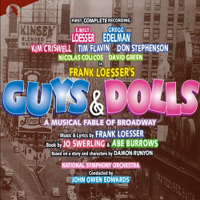 Studio Cast, 1995 (JAY, 2CDs)
Studio Cast, 1995 (JAY, 2CDs)  (5 / 5) If you must choose only one recording of Guys and Dolls to own, this gem should be it. It contains almost every note of the score as originally heard on Broadway and presents the original orchestrations and dance arrangements in stereo for the first and, so far, only time. It also has bonus tracks of songs written for the film (“Pet Me, Poppa,” “Adelaide,” and “A Woman in love”), with excellent orchestrations by Larry Moore, and the deleted Sky/Nathan duet “Travelin’ Light.” Gregg Edelman’s Sky and Emily Loesser’s Sarah are nothing less than superb, both vocally and dramatically; to hear them perform the “I’ll Know” sequence is almost as if to experience it for the first time. Another joy of this two-disc set is that it includes the entire musical scene of “My Time of Day” into “I’ve Never Been in love Before” as Loesser conceived it. This is also the only recording of the show to include the entire original “Havana” sequence. Kim Criswell is a divine Adelaide, both brassy and touching. As Nicely-Nicely, Don Stephenson successfully accomplishes the unenviable task of following in Stubby Kaye’s footprints, and if Tim Flavin is not ideal as Nathan, he’s suitable enough. Included as bonus tracks are the three songs that Frank Loesser wrote for the movie version of Guys and Dolls (“A Woman In Love,” “Pet Me, Poppa” and “Adelaide”), along with “Traveling Light,” a song for Sky Masterson that was cut from the original Broadway production. While some listeners may prefer a cast album of Guys and Dolls that represents an actual stage production, this recording offers so much in the way of theatrical atmosphere and excellent performances, not to mention completeness, that it should be a part of every collection. — J.D.
(5 / 5) If you must choose only one recording of Guys and Dolls to own, this gem should be it. It contains almost every note of the score as originally heard on Broadway and presents the original orchestrations and dance arrangements in stereo for the first and, so far, only time. It also has bonus tracks of songs written for the film (“Pet Me, Poppa,” “Adelaide,” and “A Woman in love”), with excellent orchestrations by Larry Moore, and the deleted Sky/Nathan duet “Travelin’ Light.” Gregg Edelman’s Sky and Emily Loesser’s Sarah are nothing less than superb, both vocally and dramatically; to hear them perform the “I’ll Know” sequence is almost as if to experience it for the first time. Another joy of this two-disc set is that it includes the entire musical scene of “My Time of Day” into “I’ve Never Been in love Before” as Loesser conceived it. This is also the only recording of the show to include the entire original “Havana” sequence. Kim Criswell is a divine Adelaide, both brassy and touching. As Nicely-Nicely, Don Stephenson successfully accomplishes the unenviable task of following in Stubby Kaye’s footprints, and if Tim Flavin is not ideal as Nathan, he’s suitable enough. Included as bonus tracks are the three songs that Frank Loesser wrote for the movie version of Guys and Dolls (“A Woman In Love,” “Pet Me, Poppa” and “Adelaide”), along with “Traveling Light,” a song for Sky Masterson that was cut from the original Broadway production. While some listeners may prefer a cast album of Guys and Dolls that represents an actual stage production, this recording offers so much in the way of theatrical atmosphere and excellent performances, not to mention completeness, that it should be a part of every collection. — J.D.
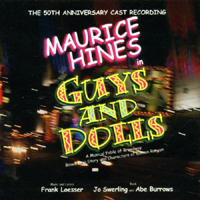 Touring Cast, 2001 (DRG)
Touring Cast, 2001 (DRG)  (1 / 5) This 50th-anniversary recording of Guys and Dolls features the cast of a touring production that began at Washington, D.C’s Arena Stage, with Maurice Hines top-billed as Nathan. Musical supervision and additional arrangements are by Danny Kosarin. The orchestrations sound like scaled-down versions of the originals, with some alterations. Overall, it’s a pretty lifeless affair with the exception of the Sky and Sarah, very well sung by real-life newlyweds Brian Sutherland and Diane Sutherland. Alexandra Foucard is bland in Adelaide’s two performance numbers, and makes dreadful attempts at humor. Even worse is her duet with Hines; to say that this rendition of “Sue Me” is of a community theater level would be insulting to community theaters everywhere. The recording goes further downhill with the worst “Sit Down, You’re Rockin’ the Boat” ever captured on disc, and an awful “Marry the Man Today” with an inexplicable female back-up chorus at the end. The bonus tracks are a plus: Frank Loesser sings seven Guys and Dolls songs, including the deleted “Travelin’ Light” and “Adelaide” from the film version. His revelatory performance of “Luck Be a Lady” should be required listening for any would-be Sky Masterson; his original verse-and-chorus ballad version of “Sue Me” is fascinating, and it’s fun to hear his renditions of “I’ll Know,” “I’ve Never Been in Love Before,” and “Sit Down, You’re Rockin’ the Boat.” These selections are also available on DRG’s An Evening With Frank Loesser, which includes Loesser’s performances of many other songs from other shows of his. That recording would be a much better purchase than this touring cast album of Guys and Dolls. — J.D.
(1 / 5) This 50th-anniversary recording of Guys and Dolls features the cast of a touring production that began at Washington, D.C’s Arena Stage, with Maurice Hines top-billed as Nathan. Musical supervision and additional arrangements are by Danny Kosarin. The orchestrations sound like scaled-down versions of the originals, with some alterations. Overall, it’s a pretty lifeless affair with the exception of the Sky and Sarah, very well sung by real-life newlyweds Brian Sutherland and Diane Sutherland. Alexandra Foucard is bland in Adelaide’s two performance numbers, and makes dreadful attempts at humor. Even worse is her duet with Hines; to say that this rendition of “Sue Me” is of a community theater level would be insulting to community theaters everywhere. The recording goes further downhill with the worst “Sit Down, You’re Rockin’ the Boat” ever captured on disc, and an awful “Marry the Man Today” with an inexplicable female back-up chorus at the end. The bonus tracks are a plus: Frank Loesser sings seven Guys and Dolls songs, including the deleted “Travelin’ Light” and “Adelaide” from the film version. His revelatory performance of “Luck Be a Lady” should be required listening for any would-be Sky Masterson; his original verse-and-chorus ballad version of “Sue Me” is fascinating, and it’s fun to hear his renditions of “I’ll Know,” “I’ve Never Been in Love Before,” and “Sit Down, You’re Rockin’ the Boat.” These selections are also available on DRG’s An Evening With Frank Loesser, which includes Loesser’s performances of many other songs from other shows of his. That recording would be a much better purchase than this touring cast album of Guys and Dolls. — J.D.
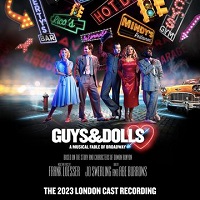 London Cast, 2023 (Broadway Records)
London Cast, 2023 (Broadway Records)  (2 / 5) The London production that yielded this cast album was praised by many for its immersive staging, but absent that element, the recording is only intermittently enjoyable. Listeners will notice three major liabilities: 1) the orchestra sounds thin, especially but not only in the string section; 2) the Noo Yawk accents sported by the cast members are very spotty, to say the least; and 3) some of these classic Frank Loesser songs are taken at tempi that feel way too slow (check out “Marry the Man Today”) and/or are presented in keys significantly lower than the originals (as is the case with “Follow the Fold” and the title song). One of the most unfortunate distortions: While Adelaide’s solo section of “Take Back Your Mink” clocks in at at a snappy 103 seconds on the original Broadway cast album, here it’s attenuated to 160 seconds due to huge pauses, vulgar over-emphases, and a draggy overall tempo, with the result that virtually all humor and wit is removed from the number. This album was recorded in the theater where the show was playing, but without a live audience present. An odd feature in this regard is that someone introduces the entire cast of leading and featured characters during the “Bows” track — a puzzling inclusion on an audio-only recording, especially without the sound of applause. As for the vocal performances: Andrew Richardson sings well and with lots of personality as Sky Masterson, though you may be distracted by the fact that his accent frequently shifts from New York to Old Blighty and back again. Cedric Neal delivers Nicely-Nicely Johnson’s musical moments in a sweeter, more lyrical voice than we usually hear in this role, yet he is able to pull out all the stops for the climaxes in “Sit Down, You’re Rockin’ the Boat.” Celinde Schoenmaker is a fine if not especially distinctive Sarah Brown, but as indicated above, Marisha Wallace aggressively oversells many of Adelaide’s comic moments to the point where more is definitely less. Like most other Nathan Detroits, Daniel Mays is given so little to do on the recording that he doesn’t make much of an impression either way, positive or negative. Finally, the ensemble numbers that have not been conducted too slowly or lowered in key — e.g., “The Oldest Established” — sound good here. – M.P.
(2 / 5) The London production that yielded this cast album was praised by many for its immersive staging, but absent that element, the recording is only intermittently enjoyable. Listeners will notice three major liabilities: 1) the orchestra sounds thin, especially but not only in the string section; 2) the Noo Yawk accents sported by the cast members are very spotty, to say the least; and 3) some of these classic Frank Loesser songs are taken at tempi that feel way too slow (check out “Marry the Man Today”) and/or are presented in keys significantly lower than the originals (as is the case with “Follow the Fold” and the title song). One of the most unfortunate distortions: While Adelaide’s solo section of “Take Back Your Mink” clocks in at at a snappy 103 seconds on the original Broadway cast album, here it’s attenuated to 160 seconds due to huge pauses, vulgar over-emphases, and a draggy overall tempo, with the result that virtually all humor and wit is removed from the number. This album was recorded in the theater where the show was playing, but without a live audience present. An odd feature in this regard is that someone introduces the entire cast of leading and featured characters during the “Bows” track — a puzzling inclusion on an audio-only recording, especially without the sound of applause. As for the vocal performances: Andrew Richardson sings well and with lots of personality as Sky Masterson, though you may be distracted by the fact that his accent frequently shifts from New York to Old Blighty and back again. Cedric Neal delivers Nicely-Nicely Johnson’s musical moments in a sweeter, more lyrical voice than we usually hear in this role, yet he is able to pull out all the stops for the climaxes in “Sit Down, You’re Rockin’ the Boat.” Celinde Schoenmaker is a fine if not especially distinctive Sarah Brown, but as indicated above, Marisha Wallace aggressively oversells many of Adelaide’s comic moments to the point where more is definitely less. Like most other Nathan Detroits, Daniel Mays is given so little to do on the recording that he doesn’t make much of an impression either way, positive or negative. Finally, the ensemble numbers that have not been conducted too slowly or lowered in key — e.g., “The Oldest Established” — sound good here. – M.P.
Grind
 Original Broadway Cast, 1985 (JAY/TER)
Original Broadway Cast, 1985 (JAY/TER)  (3 / 5) Grind, which opened during director Harold Prince’s 1980s slump, was one of the most hated shows of the period. It’s easy to understand why: Fay Kanin’s overloaded book (based on her own unproduced screenplay This Must Be the Place) deals with racism, the Depression, feminism, riots, murder, suicide, and Irish Republicanism, while the score (music by Larry Grossman, lyrics by Ellen Fitzhugh) rides one’s nerves with its harsh truths and dissonant chords. Nevertheless, this is the decade’s most fascinating misfire. It’s set in a Chicago burlesque house in 1933 where, thanks to payoffs, both black and white performers appear. Much of the action centers on the triangle between LeRoy, an Uncle Tom-like comedian (Ben Vereen); Satin, a tough-minded stripper (Leilani Jones, in a Tony-winning performance); and Doyle (Timothy Nolen), a drunken bum with a brogue and a terrible secret. Stubby Kaye as Gus, a comedian who’s losing his sight, acts as the plot’s catalyst. For many, the score is too shrill and confrontational — Bill Byers’ orchestrations are nerve-jangling — but the best stuff grabs you by the throat. Jones sizzles in the angry strip number “A Sweet Thing Like Me,” commands in “All Things to One Man,” and (with help from Vereen) wrings every bit of humor out of “Why, Mama, Why,” in which she imagines confronting her bitter mother. Nolen’s opera-level voice makes the most of “Katie, My Love” and “Down,” in which Doyle recalls his sad family history. An ensemble number, “The Grind,” acridly describes daily life in burlesque. And there’s a knockout gospel tune, “These Eyes of Mine,” led by Carol Woods. This is a recording that absolutely deserves your attention. — David Barbour
(3 / 5) Grind, which opened during director Harold Prince’s 1980s slump, was one of the most hated shows of the period. It’s easy to understand why: Fay Kanin’s overloaded book (based on her own unproduced screenplay This Must Be the Place) deals with racism, the Depression, feminism, riots, murder, suicide, and Irish Republicanism, while the score (music by Larry Grossman, lyrics by Ellen Fitzhugh) rides one’s nerves with its harsh truths and dissonant chords. Nevertheless, this is the decade’s most fascinating misfire. It’s set in a Chicago burlesque house in 1933 where, thanks to payoffs, both black and white performers appear. Much of the action centers on the triangle between LeRoy, an Uncle Tom-like comedian (Ben Vereen); Satin, a tough-minded stripper (Leilani Jones, in a Tony-winning performance); and Doyle (Timothy Nolen), a drunken bum with a brogue and a terrible secret. Stubby Kaye as Gus, a comedian who’s losing his sight, acts as the plot’s catalyst. For many, the score is too shrill and confrontational — Bill Byers’ orchestrations are nerve-jangling — but the best stuff grabs you by the throat. Jones sizzles in the angry strip number “A Sweet Thing Like Me,” commands in “All Things to One Man,” and (with help from Vereen) wrings every bit of humor out of “Why, Mama, Why,” in which she imagines confronting her bitter mother. Nolen’s opera-level voice makes the most of “Katie, My Love” and “Down,” in which Doyle recalls his sad family history. An ensemble number, “The Grind,” acridly describes daily life in burlesque. And there’s a knockout gospel tune, “These Eyes of Mine,” led by Carol Woods. This is a recording that absolutely deserves your attention. — David Barbour
Greenwillow
 Original Broadway Cast, 1960 (RCA/DRG)
Original Broadway Cast, 1960 (RCA/DRG)  (4 / 5) Composer-lyricist Frank Loesser was determined never to repeat himself in his musicals. In between his operatic The Most Happy Fella and his satirical How to Succeed in Business Without Really Trying, he created a bucolic, whimsical score for a show set in the village of Greenwillow — -perhaps located a few miles due east of the equally mythical Brigadoon. The show seemed to perplex and confuse people, its charms eluding both critics and audiences. As a result, it lingered on Broadway for just under 100 performances. We should be grateful that it opened at a time when most Broadway musicals were recorded on the first Sunday after opening, before it was known if the show would have a successful run. The album begins with church chimes and then, after a lovely prelude, moves into the syncopated opening number “A Day Borrowed From Heaven.” This sequence introduces the villagers and, eventually, the central character Gideon Briggs, played by Anthony Perkins in his first and last Broadway musical. His is not a legit musical theater voice but, having made some pop albums for RCA prior to Greenwillow, Perkins was quite secure in his singing. He combines that talent with powerful acting to excellent effect in the ebullient “Summertime Love” and the dramatic “Never Will I Marry.” Pert Kelton and Lee Cass practically steal the recording with the uproarious “Could Have Been a Ring,” in which they sing about the relationship they never had with each other. The ingenue, Ellen McCown, sounds fine in the haunting ballads “Walking Away Whistling” and “Faraway Boy,” while Cecil Kellaway and William Chapman do fine work as two very different clergymen. There is also a Frank Loesser Christmas Carol (“Greenwillow Christmas”) and a glorious song celebrating “The Music of Home.” One can forgive the occasional clunkers (such as “Clang Dang the Bell,” in which a cow gets baptized) because they are surrounded by so much good material from one of Broadway’s greatest composer-lyricists. This is a recording you are likely to love. — Jeffrey Dunn
(4 / 5) Composer-lyricist Frank Loesser was determined never to repeat himself in his musicals. In between his operatic The Most Happy Fella and his satirical How to Succeed in Business Without Really Trying, he created a bucolic, whimsical score for a show set in the village of Greenwillow — -perhaps located a few miles due east of the equally mythical Brigadoon. The show seemed to perplex and confuse people, its charms eluding both critics and audiences. As a result, it lingered on Broadway for just under 100 performances. We should be grateful that it opened at a time when most Broadway musicals were recorded on the first Sunday after opening, before it was known if the show would have a successful run. The album begins with church chimes and then, after a lovely prelude, moves into the syncopated opening number “A Day Borrowed From Heaven.” This sequence introduces the villagers and, eventually, the central character Gideon Briggs, played by Anthony Perkins in his first and last Broadway musical. His is not a legit musical theater voice but, having made some pop albums for RCA prior to Greenwillow, Perkins was quite secure in his singing. He combines that talent with powerful acting to excellent effect in the ebullient “Summertime Love” and the dramatic “Never Will I Marry.” Pert Kelton and Lee Cass practically steal the recording with the uproarious “Could Have Been a Ring,” in which they sing about the relationship they never had with each other. The ingenue, Ellen McCown, sounds fine in the haunting ballads “Walking Away Whistling” and “Faraway Boy,” while Cecil Kellaway and William Chapman do fine work as two very different clergymen. There is also a Frank Loesser Christmas Carol (“Greenwillow Christmas”) and a glorious song celebrating “The Music of Home.” One can forgive the occasional clunkers (such as “Clang Dang the Bell,” in which a cow gets baptized) because they are surrounded by so much good material from one of Broadway’s greatest composer-lyricists. This is a recording you are likely to love. — Jeffrey Dunn
Grease
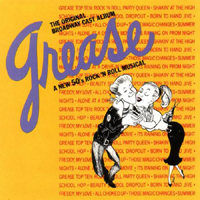 Original Broadway Cast, 1972 (MGM/Polydor)
Original Broadway Cast, 1972 (MGM/Polydor)  (4 / 5) Those who know Grease only from its inexplicably popular, sophomoric film version or the pumped-up, wrongheaded 1994 Broadway revisal will be surprised the first time they hear this album. As first seen Off-Broadway and then on Broadway after a run in Chicago, the show was an affectionate little musical about the teenage lifestyle of the late 1950s — when rock and roll was aborning, the cool boys sported heavily gelled hair and motorcycle jackets, and their girls favored beehive hairdos and pedal pushers. The original Broadway production was the long-run champ for a time, racking up 3,338 performances before it closed in 1980. With book, music, and lyrics by Jim Jacobs and Warren Casey, Grease skillfully walks the line between parody and hommage. The melodies, rhythms, harmonies, and arrangements of the songs are clever knockoffs of popular ’50s hits, very catchy and buoyed by some clever lyrics. (Example, from “Freddy, My Love”: “I treasure every giftie / The ring was really nifty / You said it cost you fifty / So you’re thrifty / I don’t mind.”) Other highlights include “Summer Nights,” which amusingly presents a boy’s and a girl’s different descriptions of their summer romance; the infectious “Magic Changes,” sung by a kid who’s thrown himself wholeheartedly into guitar lessons; “It’s Raining on Prom Night,” an oddly touching, funny lament over a lost high-school love (sample lyric: “I don’t even have my corsage, oh gee / It fell down a sewer with my sister’s I.D.”); and “We Go Together,” a bouncy anthem of teenage unity. The score does contain one serious number, and it’s a good one: “There Are Worse Things I Could Do,” sung by Rizzo, whose outward toughness masks her vulnerability. Adrienne Barbeau gives the song a moving, well sung performance. Barry Bostwick is terrific as lead greaser Danny, and Carole Demas sounds just right as Danny’s sweet girlfriend, Sandy. Among the other standouts in the cast are Katie Hanley, Walter Bobbie, and Kathi Moss. — Michael Portantiere
(4 / 5) Those who know Grease only from its inexplicably popular, sophomoric film version or the pumped-up, wrongheaded 1994 Broadway revisal will be surprised the first time they hear this album. As first seen Off-Broadway and then on Broadway after a run in Chicago, the show was an affectionate little musical about the teenage lifestyle of the late 1950s — when rock and roll was aborning, the cool boys sported heavily gelled hair and motorcycle jackets, and their girls favored beehive hairdos and pedal pushers. The original Broadway production was the long-run champ for a time, racking up 3,338 performances before it closed in 1980. With book, music, and lyrics by Jim Jacobs and Warren Casey, Grease skillfully walks the line between parody and hommage. The melodies, rhythms, harmonies, and arrangements of the songs are clever knockoffs of popular ’50s hits, very catchy and buoyed by some clever lyrics. (Example, from “Freddy, My Love”: “I treasure every giftie / The ring was really nifty / You said it cost you fifty / So you’re thrifty / I don’t mind.”) Other highlights include “Summer Nights,” which amusingly presents a boy’s and a girl’s different descriptions of their summer romance; the infectious “Magic Changes,” sung by a kid who’s thrown himself wholeheartedly into guitar lessons; “It’s Raining on Prom Night,” an oddly touching, funny lament over a lost high-school love (sample lyric: “I don’t even have my corsage, oh gee / It fell down a sewer with my sister’s I.D.”); and “We Go Together,” a bouncy anthem of teenage unity. The score does contain one serious number, and it’s a good one: “There Are Worse Things I Could Do,” sung by Rizzo, whose outward toughness masks her vulnerability. Adrienne Barbeau gives the song a moving, well sung performance. Barry Bostwick is terrific as lead greaser Danny, and Carole Demas sounds just right as Danny’s sweet girlfriend, Sandy. Among the other standouts in the cast are Katie Hanley, Walter Bobbie, and Kathi Moss. — Michael Portantiere
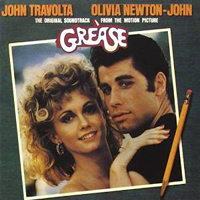 Film Soundtrack, 1978 (Polydor)
Film Soundtrack, 1978 (Polydor)  (1 / 5) The first cut on this album, a new title song (there was none in the stage show), cues you into the silly, anachronistic style of the film version of Grease. It’s a disco number, of all things, written by Barry Gibb of the Bee Gees and sung by Frankie Valli. (Although Grease is set in the late 1950s, director Randal Kleiser and colleagues apparently thought it necessary to add a disco song to the score, simply because that type of music was so popular when the film was made.) Other additions to the song stack aren’t as objectionable. Louis St. Louis wrote “Sandy,” a new lost-love song for Danny (John Travolta) that’s okay but not as much fun as “Alone at a Drive-In Movie,” the Jacobs-Casey song it replaced. John Farrar contributed “Hopelessly Devoted to You,” a pretty ballad for Sandy (Olivia Newton-John); and “You’re the One That I Want,” a Sandy-Danny duet that’s catchy but also sounds out of period despite the “oo-oo-oos” in the chorus. In Rizzo’s songs, Stockard Channing resorts to vocal mugging and over-inflection; it seems she has a fine singing voice, but doesn’t trust it. On the other hand, a plus for both the movie and the album is Frankie Avalon’s performance of “Beauty School Dropout.” Note that “Greased Lightnin'” is led here by Danny rather than Kenickie, presumably to give Travolta another showcase song. Also note that some numbers in the show score, such as “Those Magic Changes” and “It’s Raining on Prom Night,” are performed on the soundtrack album by various artists but aren’t actually included in the film, or are heard only as background music. — M.P.
(1 / 5) The first cut on this album, a new title song (there was none in the stage show), cues you into the silly, anachronistic style of the film version of Grease. It’s a disco number, of all things, written by Barry Gibb of the Bee Gees and sung by Frankie Valli. (Although Grease is set in the late 1950s, director Randal Kleiser and colleagues apparently thought it necessary to add a disco song to the score, simply because that type of music was so popular when the film was made.) Other additions to the song stack aren’t as objectionable. Louis St. Louis wrote “Sandy,” a new lost-love song for Danny (John Travolta) that’s okay but not as much fun as “Alone at a Drive-In Movie,” the Jacobs-Casey song it replaced. John Farrar contributed “Hopelessly Devoted to You,” a pretty ballad for Sandy (Olivia Newton-John); and “You’re the One That I Want,” a Sandy-Danny duet that’s catchy but also sounds out of period despite the “oo-oo-oos” in the chorus. In Rizzo’s songs, Stockard Channing resorts to vocal mugging and over-inflection; it seems she has a fine singing voice, but doesn’t trust it. On the other hand, a plus for both the movie and the album is Frankie Avalon’s performance of “Beauty School Dropout.” Note that “Greased Lightnin'” is led here by Danny rather than Kenickie, presumably to give Travolta another showcase song. Also note that some numbers in the show score, such as “Those Magic Changes” and “It’s Raining on Prom Night,” are performed on the soundtrack album by various artists but aren’t actually included in the film, or are heard only as background music. — M.P.
 Original London Cast, 1993 (Epic)
Original London Cast, 1993 (Epic)  (2 / 5) Producer Robert Stigwood interpolated the songs that were written expressly for the Grease film into his London staging of the musical. The anachronistic title number, sung here by the full company, still rankles, but other, more innocuous songs from the movie are well performed. Deborah Gibson is perfect for the role of Sandy, and Craig McLachlan is right-on as Danny. As Rizzo, Sally Ann Triplett overplays “Look at Me, I’m Sandra Dee” (and mispronounces Troy Donahue’s last name) but does a fine job with “There Are Worse Things I Could Do.” Charlotte Avery offers a regrettable Marilyn Monroe impersonation in “Freddy, My Love.” Of the others, Shane Richie’s Kenickie and John Combe’s Doody are especially commendable. — M.P.
(2 / 5) Producer Robert Stigwood interpolated the songs that were written expressly for the Grease film into his London staging of the musical. The anachronistic title number, sung here by the full company, still rankles, but other, more innocuous songs from the movie are well performed. Deborah Gibson is perfect for the role of Sandy, and Craig McLachlan is right-on as Danny. As Rizzo, Sally Ann Triplett overplays “Look at Me, I’m Sandra Dee” (and mispronounces Troy Donahue’s last name) but does a fine job with “There Are Worse Things I Could Do.” Charlotte Avery offers a regrettable Marilyn Monroe impersonation in “Freddy, My Love.” Of the others, Shane Richie’s Kenickie and John Combe’s Doody are especially commendable. — M.P.
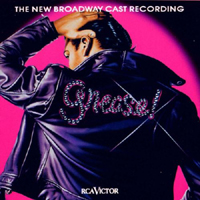 Broadway Cast, 1994 (RCA)
Broadway Cast, 1994 (RCA)  (2 / 5) The nonsensical addition of an exclamation point to the show’s title is emblematic of how overblown this production of Grease! was. The vocals of Sam Harris and Billy Porter in (respectively) “Those Magic Changes” and “Beauty School Dropout” are the clearest examples of the show’s exaggerations; both men have amazing voices, but they perform these numbers as super-aggressive power ballads rather than the charming songs they used to be. As Rizzo, Rosie O’Donnell sounds good in “Look at Me, I’m Sandra Dee” but not good in “There Are Worse Things I Could Do.” Ricky Paull [sic} Goldin and Susan Wood are fairly nondescript as Danny and Sandy, but on the credit side, Megan Mullaly is a hoot in Marty’s “Freddy, My Love.” Producers Barry and Fran Weissler couldn’t get the rights to the new songs that were written for the movie of Grease, so the track list of this recording is similar to that of the original Broadway album — except that the old favorite “Since I Don’t Have You” by Joseph Rock, James Beaumont, and the Skyliners is added for Sandy, and “All Choked Up” is cut. Let the record show that, in a strange and deplorably misleading move, this was billed as “the Tommy Tune production of Grease!” even though it was directed and choreographed by Tune protégé Jeff Calhoun. — M.P.
(2 / 5) The nonsensical addition of an exclamation point to the show’s title is emblematic of how overblown this production of Grease! was. The vocals of Sam Harris and Billy Porter in (respectively) “Those Magic Changes” and “Beauty School Dropout” are the clearest examples of the show’s exaggerations; both men have amazing voices, but they perform these numbers as super-aggressive power ballads rather than the charming songs they used to be. As Rizzo, Rosie O’Donnell sounds good in “Look at Me, I’m Sandra Dee” but not good in “There Are Worse Things I Could Do.” Ricky Paull [sic} Goldin and Susan Wood are fairly nondescript as Danny and Sandy, but on the credit side, Megan Mullaly is a hoot in Marty’s “Freddy, My Love.” Producers Barry and Fran Weissler couldn’t get the rights to the new songs that were written for the movie of Grease, so the track list of this recording is similar to that of the original Broadway album — except that the old favorite “Since I Don’t Have You” by Joseph Rock, James Beaumont, and the Skyliners is added for Sandy, and “All Choked Up” is cut. Let the record show that, in a strange and deplorably misleading move, this was billed as “the Tommy Tune production of Grease!” even though it was directed and choreographed by Tune protégé Jeff Calhoun. — M.P.
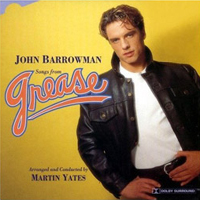 Studio Cast, 1994 (JAY)
Studio Cast, 1994 (JAY)  (2 / 5) This recording would be superfluous if not for the participation of John Barrowman, a Scottish-born singing actor who became a star of the London musical stage as a young man but who, as of this writing, has had only two brief stints on Broadway (in Putting It Together and Sunset Boulevard). Barrowman brings his strong, clear, sexy tenor to Danny’s songs and to the ridiculous “Grease” disco number that was written for the movie. The other three song additions to the flick are also included here. As Sandy, Shona Lindsay makes unpleasant sounds when belting at the top of her range. There’s nothing distinctive about the rest of the cast members, some of whom are less successful than others at masking their Brit accents. — M.P.
(2 / 5) This recording would be superfluous if not for the participation of John Barrowman, a Scottish-born singing actor who became a star of the London musical stage as a young man but who, as of this writing, has had only two brief stints on Broadway (in Putting It Together and Sunset Boulevard). Barrowman brings his strong, clear, sexy tenor to Danny’s songs and to the ridiculous “Grease” disco number that was written for the movie. The other three song additions to the flick are also included here. As Sandy, Shona Lindsay makes unpleasant sounds when belting at the top of her range. There’s nothing distinctive about the rest of the cast members, some of whom are less successful than others at masking their Brit accents. — M.P.
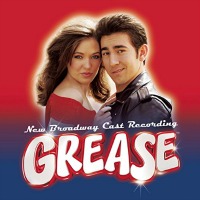 Broadway Cast, 2007 (Masterworks Broadway)
Broadway Cast, 2007 (Masterworks Broadway)  (3 / 5) If one were to make a list of cast recordings that are far more enjoyable in their own right than the shows that yielded them, this one would place pretty high on it. The latest Broadway production to bear the title Grease — this time without the silly exclamation point that was used for the 1994 revisal — had a huge red flag attached to it from the moment it was announced that the leading roles of Danny Zuko and Sandy Dumbrowski would be cast via a TV “reality” series called Grease: You’re the One That I Want! (There’s that exclamation point!) What ended up on stage was not good in terms of Kathleen Marshall’s way-off-base direction or the design elements. For better or (some would say) worse, the song stack included the now almost obligatory numbers that were written for the monster hit film of Grease: the title song, “Hopelessly Devoted to You,” “Sandy,” and yes, “You’re the One That I Want.” Of the two leads chosen by way of that idiotic TV show, only one — Laura Osnes as Sandy — proved to be ideal in every way. Count her among the cast album’s biggest assets. And though Max Crumm was/is not right for Danny in terms of physical type or personality, his vocal performance is thoroughly satisfying. Jenny Powers sounds a little square as Rizzo, but Matthew Saldivar as Kenickie does a great, sexy job with “Greased Lightnin’.” (Note that in this version, for some reason, the chicks scream rather than cream.) Ryan Patrick Binder is appealing in Doody’s “Magic Changes,” and the rest of the cast includes such talents as Stephen R. Buntrock as Teen Angel and Lindsay Mendez in her Broadway debut as Jan. The arrangements and orchestrations (by Christopher Jahnke) are not overblown as on the 1994 recording, and the sound mix is excellent. — M.P.
(3 / 5) If one were to make a list of cast recordings that are far more enjoyable in their own right than the shows that yielded them, this one would place pretty high on it. The latest Broadway production to bear the title Grease — this time without the silly exclamation point that was used for the 1994 revisal — had a huge red flag attached to it from the moment it was announced that the leading roles of Danny Zuko and Sandy Dumbrowski would be cast via a TV “reality” series called Grease: You’re the One That I Want! (There’s that exclamation point!) What ended up on stage was not good in terms of Kathleen Marshall’s way-off-base direction or the design elements. For better or (some would say) worse, the song stack included the now almost obligatory numbers that were written for the monster hit film of Grease: the title song, “Hopelessly Devoted to You,” “Sandy,” and yes, “You’re the One That I Want.” Of the two leads chosen by way of that idiotic TV show, only one — Laura Osnes as Sandy — proved to be ideal in every way. Count her among the cast album’s biggest assets. And though Max Crumm was/is not right for Danny in terms of physical type or personality, his vocal performance is thoroughly satisfying. Jenny Powers sounds a little square as Rizzo, but Matthew Saldivar as Kenickie does a great, sexy job with “Greased Lightnin’.” (Note that in this version, for some reason, the chicks scream rather than cream.) Ryan Patrick Binder is appealing in Doody’s “Magic Changes,” and the rest of the cast includes such talents as Stephen R. Buntrock as Teen Angel and Lindsay Mendez in her Broadway debut as Jan. The arrangements and orchestrations (by Christopher Jahnke) are not overblown as on the 1994 recording, and the sound mix is excellent. — M.P.
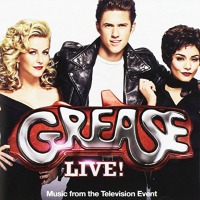 Television Cast, 2016 (Republic Records)
Television Cast, 2016 (Republic Records)  (3 / 5) A new wave of live TV presentations of Broadway musicals began in 2013 with a mostly terrible production of The Sound Of Music, since followed by several others that were not much better. Given that low bar of achievement, the best of the lot by a wide margin was Grease: Live, which aired on January 31, 2016. On the one hand, what millions of viewers saw that night was hugely different from the musical as originally conceived, written, and presented in the early 1970s; a few songs were added that had never been heard in any previous version of the show (or the movie), and the script was heavily revised by Jonathan Tolins and Robert Cary. But Grease: Live was very well done in terms of its production elements and its direction by Thomas Kail (of Broadway’s Hamilton and In The Heights) and Alex Rudzinski. A generally strong cast is headed by Aaron Tveit as Danny and Julianne Hough as Sandy (here given a new surname, “Young”), with Carlos PenaVega as Kenickie, Jordan Fisher as Doody, and Carly Rae Jepsen as Frenchy (handed a new song, “All I Need is an Angel,” by the Broadway team of Tom Kitt and Brian Yorkey). The one weak link is Vanessa Hudgens as Rizzo; her voice has a thin, bright timbre that’s all wrong for the role, and her interpretation of the songs mostly consists of aping Stockard Channing’s renditions in the film. There are also appearances by everyone from Jessie J singing the title song to Boyz II Men as the “Teen Angels” to Joe Jonas and DNCE as “Johnny Casino and the Gamblers.” Both the video and audio versions of this Grease are enjoyable if you’re willing to accept something that only intermittently resembles the property that first bore the title. — M.P.
(3 / 5) A new wave of live TV presentations of Broadway musicals began in 2013 with a mostly terrible production of The Sound Of Music, since followed by several others that were not much better. Given that low bar of achievement, the best of the lot by a wide margin was Grease: Live, which aired on January 31, 2016. On the one hand, what millions of viewers saw that night was hugely different from the musical as originally conceived, written, and presented in the early 1970s; a few songs were added that had never been heard in any previous version of the show (or the movie), and the script was heavily revised by Jonathan Tolins and Robert Cary. But Grease: Live was very well done in terms of its production elements and its direction by Thomas Kail (of Broadway’s Hamilton and In The Heights) and Alex Rudzinski. A generally strong cast is headed by Aaron Tveit as Danny and Julianne Hough as Sandy (here given a new surname, “Young”), with Carlos PenaVega as Kenickie, Jordan Fisher as Doody, and Carly Rae Jepsen as Frenchy (handed a new song, “All I Need is an Angel,” by the Broadway team of Tom Kitt and Brian Yorkey). The one weak link is Vanessa Hudgens as Rizzo; her voice has a thin, bright timbre that’s all wrong for the role, and her interpretation of the songs mostly consists of aping Stockard Channing’s renditions in the film. There are also appearances by everyone from Jessie J singing the title song to Boyz II Men as the “Teen Angels” to Joe Jonas and DNCE as “Johnny Casino and the Gamblers.” Both the video and audio versions of this Grease are enjoyable if you’re willing to accept something that only intermittently resembles the property that first bore the title. — M.P.
The Grass Harp
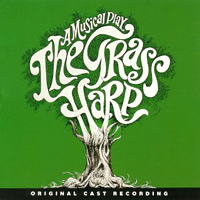 Original Broadway Cast, 1971 (Painted Smiles/Varèse Sarabande)
Original Broadway Cast, 1971 (Painted Smiles/Varèse Sarabande)  (5 / 5) Even if it didn’t star Barbara Cook, in resplendent voice in her last Broadway musical, this would be the most glorious cast album that you’ve never heard. A messy book (from Truman Capote’s novella) and under-financing shuttered the poorly received show after five performances in 1971. But this recording, made some months later with almost the entire original cast (a chorus of adults subbed for a chorus of children), preserves the lustrous music of Claibe Richardson and the sharp lyrics of Kenward Elmslie that combine to conjure up the rustic South in the early part of the 20th century. Cook plays Dollyheart, who tends the home of her breadwinner sister Verena (Ruth Ford), who has fallen in love with Dr. Morris Ritz (Max Showalter). The doc wants to market the dropsy cure that Dollyheart’s been making in the backyard with nephew Collin (Russ Thacker) and maid Catherine (Carol Brice). But Dollyheart won’t give up her secret formula, and this causes Verena to lash out at her. So Dollyheart takes Collin, Catherine, and the cure with her on what becomes a modest adventure with a faith healer (Karen Morrow). It’s all set to a fine score with orchestrations split among old master Robert Russell Bennett, new master Jonathan Tunick, and jazz specialist J. Billy Ver Planck. Cook has two beautiful ballads, “Chain of Love” and “Reach Out.” Brice gets one that’s a bolt of lightning, “If There’s Love Enough,” and another that’s top-notch comedy, “Marry With Me.” Thacker delivers the raucous “Floozies” and the more tender “This One Day,” while Morrow gets the 12-minute masterpiece “The Babylove Miracle Show,” in which the faith healer encourages her listeners to “hang a little moolah on the wash line.” It might well seduce you into opening your wallet; you’ll be glad you did so in order to buy the cast album of The Grass Harp. — Peter Filichia
(5 / 5) Even if it didn’t star Barbara Cook, in resplendent voice in her last Broadway musical, this would be the most glorious cast album that you’ve never heard. A messy book (from Truman Capote’s novella) and under-financing shuttered the poorly received show after five performances in 1971. But this recording, made some months later with almost the entire original cast (a chorus of adults subbed for a chorus of children), preserves the lustrous music of Claibe Richardson and the sharp lyrics of Kenward Elmslie that combine to conjure up the rustic South in the early part of the 20th century. Cook plays Dollyheart, who tends the home of her breadwinner sister Verena (Ruth Ford), who has fallen in love with Dr. Morris Ritz (Max Showalter). The doc wants to market the dropsy cure that Dollyheart’s been making in the backyard with nephew Collin (Russ Thacker) and maid Catherine (Carol Brice). But Dollyheart won’t give up her secret formula, and this causes Verena to lash out at her. So Dollyheart takes Collin, Catherine, and the cure with her on what becomes a modest adventure with a faith healer (Karen Morrow). It’s all set to a fine score with orchestrations split among old master Robert Russell Bennett, new master Jonathan Tunick, and jazz specialist J. Billy Ver Planck. Cook has two beautiful ballads, “Chain of Love” and “Reach Out.” Brice gets one that’s a bolt of lightning, “If There’s Love Enough,” and another that’s top-notch comedy, “Marry With Me.” Thacker delivers the raucous “Floozies” and the more tender “This One Day,” while Morrow gets the 12-minute masterpiece “The Babylove Miracle Show,” in which the faith healer encourages her listeners to “hang a little moolah on the wash line.” It might well seduce you into opening your wallet; you’ll be glad you did so in order to buy the cast album of The Grass Harp. — Peter Filichia
The Grand Tour
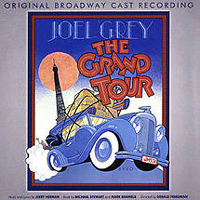 Original Broadway Cast, 1979 (Columbia/Fynsworth Alley)
Original Broadway Cast, 1979 (Columbia/Fynsworth Alley)  (2 / 5) This is the cheeriest musical ever written about escaping from the Nazis. Jerry Herman has dismissed the show as a mistake (“It just didn’t have the energy and excitement to be a real hit”), but no Herman score is without interest. Michael Stewart adapted S. N. Behrman’s play Jacobowsky and the Colonel, itself an adaptation of a work by Franz Werfel. Set in 1940, the plot centers on a Jewish refugee (Joel Grey) trying to get out of German-occupied France in the company of a chilly, anti-Semitic Polish colonel (Ron Holgate) and his girlfriend, Marianne (Florence Lacey). Some of the score is extraordinary, including Jacobowsky’s signature tune “I’ll Be Here Tomorrow,” rendered unforgettably by Grey; Marianne’s hymn to her home, “I Belong Here”; and Holgate’s lovely ballad “Marianne.” But Herman’s generally bouncy attitude has an undermining effect on what is, after all, a very dramatic story. A number on a train, “We’re Almost There,” is disconcertingly upbeat. So is “You I Like,” sung when the two men finally bond. “For Poland,” in which Jacobowsky coaxes the colonel into letting him come along, sounds like the football fight song of a Midwestern university. (Philip J. Lang’s orchestrations only accentuate the positive.) All three leads are superb, however, and the score is never less than easy to take. — David Barbour
(2 / 5) This is the cheeriest musical ever written about escaping from the Nazis. Jerry Herman has dismissed the show as a mistake (“It just didn’t have the energy and excitement to be a real hit”), but no Herman score is without interest. Michael Stewart adapted S. N. Behrman’s play Jacobowsky and the Colonel, itself an adaptation of a work by Franz Werfel. Set in 1940, the plot centers on a Jewish refugee (Joel Grey) trying to get out of German-occupied France in the company of a chilly, anti-Semitic Polish colonel (Ron Holgate) and his girlfriend, Marianne (Florence Lacey). Some of the score is extraordinary, including Jacobowsky’s signature tune “I’ll Be Here Tomorrow,” rendered unforgettably by Grey; Marianne’s hymn to her home, “I Belong Here”; and Holgate’s lovely ballad “Marianne.” But Herman’s generally bouncy attitude has an undermining effect on what is, after all, a very dramatic story. A number on a train, “We’re Almost There,” is disconcertingly upbeat. So is “You I Like,” sung when the two men finally bond. “For Poland,” in which Jacobowsky coaxes the colonel into letting him come along, sounds like the football fight song of a Midwestern university. (Philip J. Lang’s orchestrations only accentuate the positive.) All three leads are superb, however, and the score is never less than easy to take. — David Barbour
A Grand Night for Singing
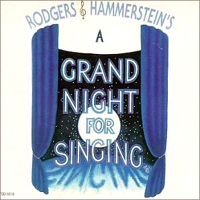 Members of the Broadway Cast, 1994 (Varèse Sarabande)
Members of the Broadway Cast, 1994 (Varèse Sarabande)  (2 / 5) This revue of songs from Rodgers and Hammerstein musicals was directed by Walter Bobbie, with musical direction by Fred Wells. It opened at the now-defunct, high-class cabaret venue Rainbow & Stars at Rockefeller Center in 1993; then, later that year, the show had a brief run on Broadway in a Roundabout Theatre production. It’s an amiable compilation of beloved standards such as “Hello, Young Lovers,” “If I Loved You,” “Some Enchanted Evening,” “Oh, What a Beautiful Mornin’,” and “It Might as Well Be Spring,” along with several of the team’s songs that are not as famous but well worth hearing, including as “So Far” and “Don’t Marry Me.” Some of the songs are performed in full, while others are excerpted in medleys. The show received Tony Award nominations for Best Musical and, believe it or not, Best Book of a Musical. This recording features the Broadway company — Victoria Clark, Jason Graae, Alyson Reed, Lynne Wintersteller — plus Gregg Edelman filling in for Martin Vidnovic. The songs of Rodgers and Hammerstein, like those of Stephen Sondheim, tend not to work very well in a revue format because they were so skillfully tailored to specific characters and situations. Two that suffer greatly when taken out of context are the comedic “I Cain’t Say No” from Oklahoma! and “Honey Bun” from South Pacific. Others stand better on their own, for example, the ballads “Do I Love You Because You’re Beautiful?” (from Cinderella) and “This Nearly Was Mine” (from South Pacific). This recording can’t hold a candle to any cast album of a full Rodgers and Hammerstein musical, but it can be enjoyed as a sampler of the legendary team’s work. — Michael Portantiere
(2 / 5) This revue of songs from Rodgers and Hammerstein musicals was directed by Walter Bobbie, with musical direction by Fred Wells. It opened at the now-defunct, high-class cabaret venue Rainbow & Stars at Rockefeller Center in 1993; then, later that year, the show had a brief run on Broadway in a Roundabout Theatre production. It’s an amiable compilation of beloved standards such as “Hello, Young Lovers,” “If I Loved You,” “Some Enchanted Evening,” “Oh, What a Beautiful Mornin’,” and “It Might as Well Be Spring,” along with several of the team’s songs that are not as famous but well worth hearing, including as “So Far” and “Don’t Marry Me.” Some of the songs are performed in full, while others are excerpted in medleys. The show received Tony Award nominations for Best Musical and, believe it or not, Best Book of a Musical. This recording features the Broadway company — Victoria Clark, Jason Graae, Alyson Reed, Lynne Wintersteller — plus Gregg Edelman filling in for Martin Vidnovic. The songs of Rodgers and Hammerstein, like those of Stephen Sondheim, tend not to work very well in a revue format because they were so skillfully tailored to specific characters and situations. Two that suffer greatly when taken out of context are the comedic “I Cain’t Say No” from Oklahoma! and “Honey Bun” from South Pacific. Others stand better on their own, for example, the ballads “Do I Love You Because You’re Beautiful?” (from Cinderella) and “This Nearly Was Mine” (from South Pacific). This recording can’t hold a candle to any cast album of a full Rodgers and Hammerstein musical, but it can be enjoyed as a sampler of the legendary team’s work. — Michael Portantiere
Grand Hotel
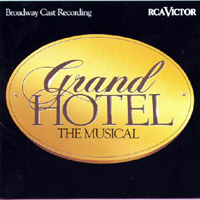 Broadway Cast, 1992 (RCA)
Broadway Cast, 1992 (RCA)  (4 / 5) Based on the Vicki Baum novel that inspired the classic MGM film, Grand Hotel traveled a crooked road to Broadway. The first pass at the material, by librettist Luther Davis and songwriters Robert Wright and George Forrest, was titled At the Grand. It closed out of town in 1958. Decades later, the project was resurrected by director-choreographer Tommy Tune. When trouble set in on the road, Tune brought in Peter Stone to rewrite the book and Maury Yeston to write seven new numbers and revise existing ones — with no credit and little credit, respectively. Even with mixed reviews, Grand Hotel ran over a thousand performances. It was widely felt that Tune’s brilliant staging had triumphed over weak material. But, as this disc shows, the score is no cut-and-paste job; every song meshes perfectly in this drama of life, death, and reversals of fortune in a Weimar Berlin hotel. In fact, it’s hard to tell who composed which songs without referring to the notes, especially since it’s not indicated which of the Wright/Forrest songs were revised by Yeston. Peter Matz’s orchestrations merge sinister, Kurt Weillesque downbeats with tinselly tea-dance rhythms and soaring melodies to create a brooding score that perfectly mirrors the fatalistic narrative. There are some routine items here, but the best songs are thrilling, including the romantic “Love Can’t Happen,” the sizzling jazz duet “Maybe My Baby Loves Me,” and “I Want to Go to Hollywood,” a bouncy number with dark undertones. (The first- and third-named of these are by Yeston, the second by Wright/Forrest). Recorded late in the show’s run, the disc features most of the original cast, including Liliane Montevecchi as an aging ballerina, Karen Akers as her devoted companion, Jane Krakowski as a sexy stenographer, and Michael Jeter as a dying bookkeeper. Sadly, David Carroll, who played Montevecchi’s doomed lover, died of AIDS before he could record his performance; his songs are covered by his capable replacement, Brent Barrett, and a bonus track features a live recording of Carroll singing “Love Can’t Happen” in a cabaret revue. Overall, Grand Hotel is a potent musical soap opera. — David Barbour
(4 / 5) Based on the Vicki Baum novel that inspired the classic MGM film, Grand Hotel traveled a crooked road to Broadway. The first pass at the material, by librettist Luther Davis and songwriters Robert Wright and George Forrest, was titled At the Grand. It closed out of town in 1958. Decades later, the project was resurrected by director-choreographer Tommy Tune. When trouble set in on the road, Tune brought in Peter Stone to rewrite the book and Maury Yeston to write seven new numbers and revise existing ones — with no credit and little credit, respectively. Even with mixed reviews, Grand Hotel ran over a thousand performances. It was widely felt that Tune’s brilliant staging had triumphed over weak material. But, as this disc shows, the score is no cut-and-paste job; every song meshes perfectly in this drama of life, death, and reversals of fortune in a Weimar Berlin hotel. In fact, it’s hard to tell who composed which songs without referring to the notes, especially since it’s not indicated which of the Wright/Forrest songs were revised by Yeston. Peter Matz’s orchestrations merge sinister, Kurt Weillesque downbeats with tinselly tea-dance rhythms and soaring melodies to create a brooding score that perfectly mirrors the fatalistic narrative. There are some routine items here, but the best songs are thrilling, including the romantic “Love Can’t Happen,” the sizzling jazz duet “Maybe My Baby Loves Me,” and “I Want to Go to Hollywood,” a bouncy number with dark undertones. (The first- and third-named of these are by Yeston, the second by Wright/Forrest). Recorded late in the show’s run, the disc features most of the original cast, including Liliane Montevecchi as an aging ballerina, Karen Akers as her devoted companion, Jane Krakowski as a sexy stenographer, and Michael Jeter as a dying bookkeeper. Sadly, David Carroll, who played Montevecchi’s doomed lover, died of AIDS before he could record his performance; his songs are covered by his capable replacement, Brent Barrett, and a bonus track features a live recording of Carroll singing “Love Can’t Happen” in a cabaret revue. Overall, Grand Hotel is a potent musical soap opera. — David Barbour
Goodtime Charley
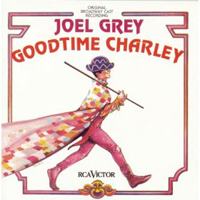 Original Broadway Cast, 1976 (RCA)
Original Broadway Cast, 1976 (RCA)  (3 / 5) As he did with Ben Franklin in Paris, librettist Sidney Michaels — this time leaving the lyrics to other, more expert hands — tried to give old European history new Broadway pizzazz in this somewhat cumbersome retelling of Charles VII’s relationship with Joan of Arc. If that sounds to you like a topic that doesn’t naturally sing, you’re right; there are abrupt shifts of tone between heavy, Old World seriousness and musical-comedy silliness. And, oddly for a big Broadway score, nearly all of Larry Grossman and Hal Hackady’s songs are given to Charles (Joel Grey) or Joan (Ann Reinking), leaving little for the chorus or for the large, interesting supporting cast (Susan Browning, Richard B. Shull, Grace Keagy, Louis Zorich, Jay Garner, and others) to do. Still, Grossman and Hackady offer an enterprising attempt at a traditional Broadway-style score of wit and substance. There are no inappropriate rock posturings here, but there are some quite wonderful lyrics in such numbers as “Why Can’t We All Be Nice?” and “Voices and Visions.” Speaking of voices, Reinking’s has an unpleasant, pseudo-Gwen Verdon rasp. And Grey — outfitted with all the accoutrements of a big-musical leading role, including a heavy breathing 11-o’clock number — tends to over-emote. But this is a score of which connoisseurs of musical theater are understandably fond, and the recording is a lively, tuneful history lesson bolstered by Jonathan Tunick’s excellent orchestrations. — Marc Miller
(3 / 5) As he did with Ben Franklin in Paris, librettist Sidney Michaels — this time leaving the lyrics to other, more expert hands — tried to give old European history new Broadway pizzazz in this somewhat cumbersome retelling of Charles VII’s relationship with Joan of Arc. If that sounds to you like a topic that doesn’t naturally sing, you’re right; there are abrupt shifts of tone between heavy, Old World seriousness and musical-comedy silliness. And, oddly for a big Broadway score, nearly all of Larry Grossman and Hal Hackady’s songs are given to Charles (Joel Grey) or Joan (Ann Reinking), leaving little for the chorus or for the large, interesting supporting cast (Susan Browning, Richard B. Shull, Grace Keagy, Louis Zorich, Jay Garner, and others) to do. Still, Grossman and Hackady offer an enterprising attempt at a traditional Broadway-style score of wit and substance. There are no inappropriate rock posturings here, but there are some quite wonderful lyrics in such numbers as “Why Can’t We All Be Nice?” and “Voices and Visions.” Speaking of voices, Reinking’s has an unpleasant, pseudo-Gwen Verdon rasp. And Grey — outfitted with all the accoutrements of a big-musical leading role, including a heavy breathing 11-o’clock number — tends to over-emote. But this is a score of which connoisseurs of musical theater are understandably fond, and the recording is a lively, tuneful history lesson bolstered by Jonathan Tunick’s excellent orchestrations. — Marc Miller
Good News
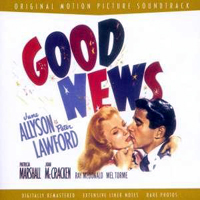 Film Soundtrack, 1947 (MGM/Rhino)
Film Soundtrack, 1947 (MGM/Rhino)  (2 / 5) The first movie written by Betty Comden and Adolph Green for MGM, Good News has a smart and funny script. Only six songs were retained from the original 1927 hit stage musical by Ray Henderson, Lew Brown, and B. G. DeSylva. Three of them — the title song, “The Varsity Drag,” and “He’s a Ladies’ Man” (here changed to “Be a Ladies’ Man”) — were extensively reworked by vocal arranger Kay Thompson and co-producer Roger Edens. In addition, Edens wrote two new songs with Comden and Green: “The French Lesson,” a real highlight, and “An Easier Way,” which didn’t make it to the final cut of the film. Also interpolated was the Edens-Hugh Martin-Ralph Blane number “Pass That Peace Pipe.” Leads Peter Lawford and June Allyson sing passably well. The third major player, Broadway dancer and comedienne Joan McCracken, was more comfortable dancing than singing and is perhaps more effective in the film than on this recording. Though the show and the movie take place in the 1920s, no attempt was made to capture the feel of that era in the musical arrangements, which sound like ’40s pop. The Rhino CD marked the first complete release of the soundtrack; it includes Mel Torme’s outtake reprise of “Lucky in Love” and the deleted “An Easier Way,” an interesting piece that contrasts the characters played by Allyson and Patricia Marshall. The CD also has a dopey interview with Allyson and two cuts, “The Varsity Drag” and the title song, from the apparently lost 1930 film version of the stage musical. — David Wolf
(2 / 5) The first movie written by Betty Comden and Adolph Green for MGM, Good News has a smart and funny script. Only six songs were retained from the original 1927 hit stage musical by Ray Henderson, Lew Brown, and B. G. DeSylva. Three of them — the title song, “The Varsity Drag,” and “He’s a Ladies’ Man” (here changed to “Be a Ladies’ Man”) — were extensively reworked by vocal arranger Kay Thompson and co-producer Roger Edens. In addition, Edens wrote two new songs with Comden and Green: “The French Lesson,” a real highlight, and “An Easier Way,” which didn’t make it to the final cut of the film. Also interpolated was the Edens-Hugh Martin-Ralph Blane number “Pass That Peace Pipe.” Leads Peter Lawford and June Allyson sing passably well. The third major player, Broadway dancer and comedienne Joan McCracken, was more comfortable dancing than singing and is perhaps more effective in the film than on this recording. Though the show and the movie take place in the 1920s, no attempt was made to capture the feel of that era in the musical arrangements, which sound like ’40s pop. The Rhino CD marked the first complete release of the soundtrack; it includes Mel Torme’s outtake reprise of “Lucky in Love” and the deleted “An Easier Way,” an interesting piece that contrasts the characters played by Allyson and Patricia Marshall. The CD also has a dopey interview with Allyson and two cuts, “The Varsity Drag” and the title song, from the apparently lost 1930 film version of the stage musical. — David Wolf
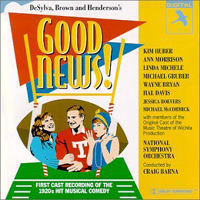 Studio Recording With Cast Members of the Music Theatre of Wichita Production, 1996 (TER-JAY)
Studio Recording With Cast Members of the Music Theatre of Wichita Production, 1996 (TER-JAY)  (2 / 5) Some months after the closing of an unsuccessful 1975 Broadway revival of Good News, cast member Wayne Bryan produced a privately issued album of that production from a tape of a live performance, plus a second LP containing items that had been cut during the show’s tryout. In an ideal world, this is the recording that would be widely available, but it is not. Bryan never lost his fondness for this material, and years later, as producing director for the Music Theatre of Wichita, he and writer-director Mark Madama got permission to write a new version of the show. That successful 1993 production was the basis for the album at hand. Though it presents the basic, original stage score plus seven more Henderson-Brown-DeSylva songs, including “Button Up Your Overcoat,” “You’re the Cream in My Coffee,” “Life Is Just a Bowl of Cherries,” and “Keep Your Sunny Side Up,” the recording is a little pale. Craig Barna’s orchestrations are thin, and his musical direction doesn’t have much spirit. The performers — Ann Morrison, Michael Gruber, Kim Huber, Linda Michele, and Jessica Boevers — are fairly colorless. They’re joined by Wayne Bryan himself, who was probably too old by then to play an undergraduate but who still sounds terrific, especially in “Never Swat a Fly.” With its irresistible score and archetypal plot about a football player who must pass his astronomy final if he wants to play in the Big Game, Good News is good fun, and while this disc isn’t bad by any means, the material deserves to be performed with a little more sass. — D.W.
(2 / 5) Some months after the closing of an unsuccessful 1975 Broadway revival of Good News, cast member Wayne Bryan produced a privately issued album of that production from a tape of a live performance, plus a second LP containing items that had been cut during the show’s tryout. In an ideal world, this is the recording that would be widely available, but it is not. Bryan never lost his fondness for this material, and years later, as producing director for the Music Theatre of Wichita, he and writer-director Mark Madama got permission to write a new version of the show. That successful 1993 production was the basis for the album at hand. Though it presents the basic, original stage score plus seven more Henderson-Brown-DeSylva songs, including “Button Up Your Overcoat,” “You’re the Cream in My Coffee,” “Life Is Just a Bowl of Cherries,” and “Keep Your Sunny Side Up,” the recording is a little pale. Craig Barna’s orchestrations are thin, and his musical direction doesn’t have much spirit. The performers — Ann Morrison, Michael Gruber, Kim Huber, Linda Michele, and Jessica Boevers — are fairly colorless. They’re joined by Wayne Bryan himself, who was probably too old by then to play an undergraduate but who still sounds terrific, especially in “Never Swat a Fly.” With its irresistible score and archetypal plot about a football player who must pass his astronomy final if he wants to play in the Big Game, Good News is good fun, and while this disc isn’t bad by any means, the material deserves to be performed with a little more sass. — D.W.
The Goodbye Girl
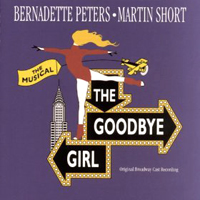 Original Broadway Cast, 1993 (Columbia/Sony)
Original Broadway Cast, 1993 (Columbia/Sony)  (3 / 5) The Goodbye Girl is a fine movie that was probably not a sound choice for adaptation as a stage musical, even if crafted by gifted, intelligent people, as it was: The Neil Simon plot is too uncomplicated and event-free, the characters too “small” and too few. The resulting show featured three major characters and an irrelevant landlady wandering through massive sets, twice running into some chorus dancers who might have come from a musical playing down the block. Composer Marvin Hamlisch and lyricist David Zippel certainly know how to write good songs, and their score is never less than professional. But instead of helping to progress the plot, the numbers just slow things down. Martin Short as Elliot got the best of the songs: “My Rules,” “I Think I Can Play This Part,” and “Paula: An Improvised Love Song,” all of which gave him plenty of room to clown. Top-billed Bernadette Peters, as Paula, wasn’t so lucky, having been handed some fairly generic ballads; but she does very well when the material is there for her, as in “A Beat Behind” and “Good News/Bad News.” The orchestrations of Billy Byers and Torrie Zito are slick and sharp, and the album is quite pleasant to listen to even if the score is never inspired. — David Wolf
(3 / 5) The Goodbye Girl is a fine movie that was probably not a sound choice for adaptation as a stage musical, even if crafted by gifted, intelligent people, as it was: The Neil Simon plot is too uncomplicated and event-free, the characters too “small” and too few. The resulting show featured three major characters and an irrelevant landlady wandering through massive sets, twice running into some chorus dancers who might have come from a musical playing down the block. Composer Marvin Hamlisch and lyricist David Zippel certainly know how to write good songs, and their score is never less than professional. But instead of helping to progress the plot, the numbers just slow things down. Martin Short as Elliot got the best of the songs: “My Rules,” “I Think I Can Play This Part,” and “Paula: An Improvised Love Song,” all of which gave him plenty of room to clown. Top-billed Bernadette Peters, as Paula, wasn’t so lucky, having been handed some fairly generic ballads; but she does very well when the material is there for her, as in “A Beat Behind” and “Good News/Bad News.” The orchestrations of Billy Byers and Torrie Zito are slick and sharp, and the album is quite pleasant to listen to even if the score is never inspired. — David Wolf
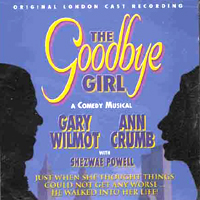 Original London Cast, 1997 (First Night)
Original London Cast, 1997 (First Night)  (1 / 5) Four years after the failure of The Goodbye Girl on Broadway, Neil Simon tried again, this time in London. He brought along composer Marvin Hamlisch but, for whatever reason, not lyricist David Zippel. So, except for the two best Zippel songs — “My Rules” and “Good News/Bad News” — this is an entirely new score with lyrics by Don Black. And it’s much worse. Zippel, an extremely clever wordsmith, wrote lyrics that were always believable extensions of the script. Black’s are just pop songs. For the most part, they’re vague, uninteresting, and difficult to understand. (One lyric goes: “I’Il take the sky / I’ll take the moon / I’ll take the child with the yellow balloon.”) The basic flatness of the characters doesn’t help; nor does Ann Crumb as Paula, whose diction is simply terrible. And Gary Wilmot is unimpressive as Elliot. Hamlisch’s new music is loud and, in an attempt to be more “contemporary,” uncharacteristically ugly — at least, as heard in these trashy arrangements. On Broadway, The Goodbye Girl was a classy failure, but this version sounds like just another flop. — D.W.
(1 / 5) Four years after the failure of The Goodbye Girl on Broadway, Neil Simon tried again, this time in London. He brought along composer Marvin Hamlisch but, for whatever reason, not lyricist David Zippel. So, except for the two best Zippel songs — “My Rules” and “Good News/Bad News” — this is an entirely new score with lyrics by Don Black. And it’s much worse. Zippel, an extremely clever wordsmith, wrote lyrics that were always believable extensions of the script. Black’s are just pop songs. For the most part, they’re vague, uninteresting, and difficult to understand. (One lyric goes: “I’Il take the sky / I’ll take the moon / I’ll take the child with the yellow balloon.”) The basic flatness of the characters doesn’t help; nor does Ann Crumb as Paula, whose diction is simply terrible. And Gary Wilmot is unimpressive as Elliot. Hamlisch’s new music is loud and, in an attempt to be more “contemporary,” uncharacteristically ugly — at least, as heard in these trashy arrangements. On Broadway, The Goodbye Girl was a classy failure, but this version sounds like just another flop. — D.W.

